Past Departmental Events
Creating a Culture of Access: Workshop with Dr. Amy Kenny
September 29, 2023
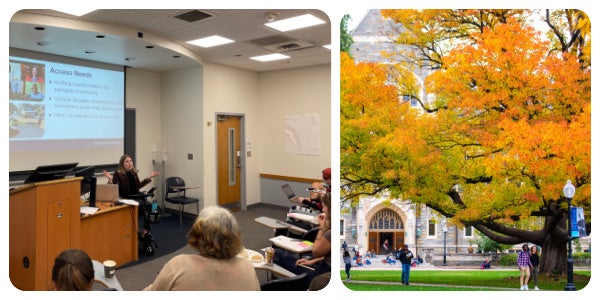
More than 14% of Georgetown undergraduate students, 10% of Georgetown graduate students, and 26% of adults in the US identify as disabled. The workshop held on September 29, 2023, was designed for faculty and grad students who want to make their classroom and department more accessible and inclusive, and want practical guidance on how to do so. Together, we explored how to create a culture of access by discussing best practices and language about disability. Led by Dr. Amy Kenny of the Disability Cultural Initiative, this workshop moved beyond individual compliance and into curating a community where disabled students, peers, and colleagues can thrive.
Dr. Amy Kenny is a disabled scholar-practitioner whose writing has been featured in Teen Vogue, Sojourners, Shondaland, Reader’s Digest, Huff Post, and in her award-winning book, My Body Is Not a Prayer Request. Kenny has served on the Mayor’s Equity, Diversity, and Inclusion taskforce, as a facilitator for Freedom Road Institute for Leadership and Justice, and is a co-founder of Jubilee Homes OC, a permanent supportive housing initiative in her community to support neighbors experiencing homelessness. She currently leads the Disability Cultural Initiative at Georgetown University, which seeks to celebrate the diverse disability community and cultivate a culture of access across campus.
The Differences ‘Racial’ Intermarried History Makes for Understanding Hitler’s Rule
September 22, 2023
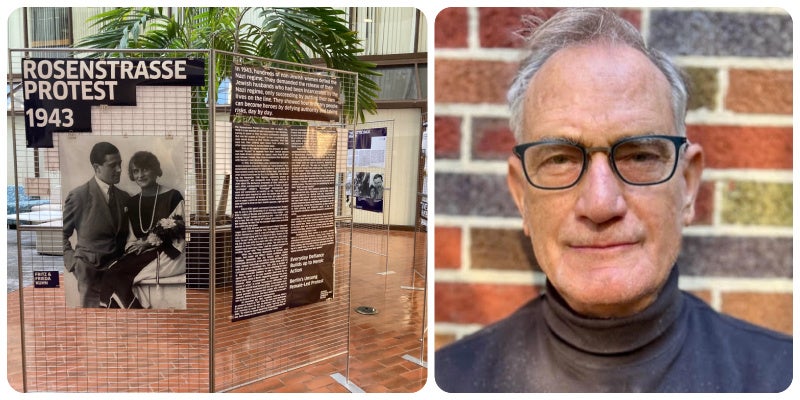
On September 22, the German Department welcomed Dr. Nathan Stoltzfus as part of the German Campus Week “Give Us Our Husbands Back” exhibition focusing on the 1943 Rosenstrasse protests. His visit coincided with the display about the protests, which could be viewed in the ICC Galleria. Dr. Stoltzfus’ talk investigated the significance of the history of ‘racial’ intermarriages for understanding Nazism in several ways, beginning with the everyday practice of defiance among non-Jewish partners he has interviewed. It explored whether the everyday defiance of intermarried Germans represents possibilities which were available to ‘ordinary Germans’ generally. It also considered whether any characteristics of Hitler’s rule of the Reich appear more clearly through the specific study of the history of intermarriages.
Nathan Stoltzfus is Rintels Professor of Holocaust Studies at Florida State University. He is a co-founder of the Rosenstrasse (Civil Courage) Foundation and has published nine books. Resistance of the Heart: Intermarriage and the Rosenstrasse Protest (WW Norton, 1996) was a Fraenkel Prize winner and a New Statesman Book of the Year. He has appeared in popular publications including The Atlantic Monthly, Der Spiegel, Die Zeit, The Daily Beast, and The American Scholar.
“Und die Schrift tönt”: Literary Hermeneutics and Sonic Fictionalizing
September 15, 2023
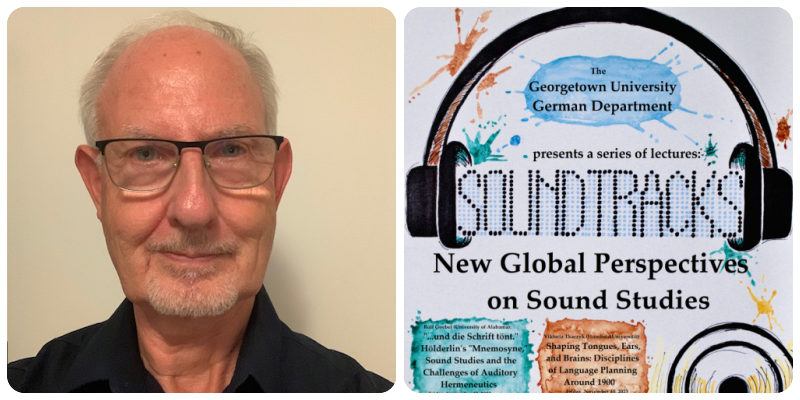
As part the “Soundtracks” lecture series, the German Department welcomed Dr. Rolf Goebel (University of Alabama – Huntsville) to the department on Friday, September 15. Starting from Friedrich Hölderlin’s late poem Mnemosyne, the lecture interrogated the uncertain ability of literary hermeneutics to decipher poetic representations of sound. At the point where this interpretive desire threatens to fail, musical compositions (like Peter Ruzicka’s Mnemosyne–Remembrance and Forgetting) may offer some meanings that the poem itself hides. But ultimately, it is the reader’s own attentive but idiosyncratic act of sonic fictionalizing that can imaginatively explore auditive significance in poetic texts that the written letter itself simultaneously discloses and conceals. This dynamic opens up new avenues for the mutually illuminating collaboration between literary criticism, musicology, and sound studies.
Rolf J. Goebel is Distinguished Professor of German, Emeritus, University of Alabama in Huntsville. His book publications include: Benjamin heute: Großstadtdiskurs, Postkolonialität und Flanerie zwischen den Kulturen (2001); and Klang im Zeitalter technischer Medien: Eine Einführung (2017). He is co-author of A Franz Kafka Encyclopedia (with Richard T. Gray, Ruth V. Gross und Clayton Koelb, 2005) and the editor of A Companion to the Works of Walter Benjamin (2009), as well as A Companion to Sound in German-Speaking Cultures (forthcoming). Goebel is also active as a non-professional organist and harpsichordist.
Reading and workshop with author Christopher Kloeble
April 20-21, 2023
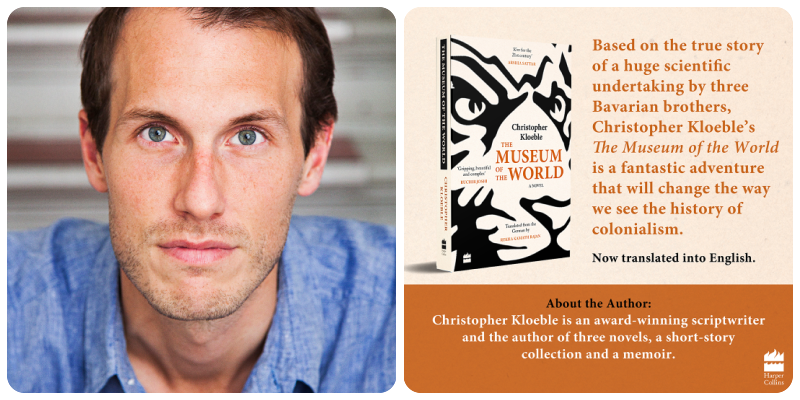
The German Department welcomed author and former Max Kade Writer-in-Residence Christopher Kloeble back to the department! Mr. Kloeble presented a reading from his newest novel Das Museum der Welt (The Museum of the World) on April 20, which has recently been translated into English. On April 21, he hosted a workshop titled “Changing your perspective on the colonial past & retelling history through stories.”
Christopher Kloeble (new window) is a German novelist, playwright, and scriptwriter. He studied at the German Creative Writing Program Leipzig and at the University for Film and Television in Munich, and he has held teaching assignments and residencies in Germany, the US, the UK, and India, among others. Kloeble is the author of numerous additional novels, including Unter Einzelgängern, Wenn es klopft, Meistens alles sehr schnell, and Die unsterbliche Familie Salz. His first non-fiction book, Home Made in India, was published in 2017. He lives in Berlin and Delhi.
‘Passages’: Moving beyond liminality in the study of literature and culture
November 15, 2022
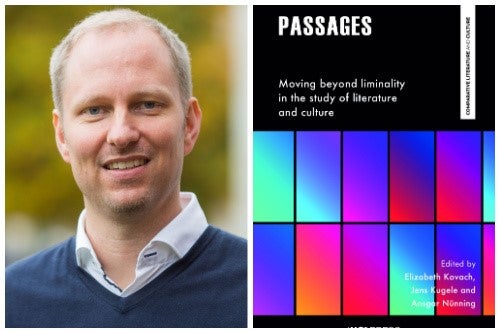
Visiting Max Kade guest professor Jens Kugele presented on the edited volume “‘Passages’: Moving beyond liminality in the study of literature and culture” on Tuesday, November 15, 2022. The study of literature and culture is marked by various distinct understandings of passages – both as phenomena and critical concepts. These include the anthropological notion of rites of passage, the shopping arcades (Passagen) theorized by Walter Benjamin, the Middle Passage of the Atlantic slave trade, present-day forms of migration and resettlement, and understandings of translation and adaptation. Whether structural, semiotic, spatial/geographic, temporal, existential, societal or institutional, passages refer to processes of (status) change. They enable entrances and exits, arrivals and departures, while they also foster moments of liminality and suspension. They connect and thereby engender difference.
The project is an exploration of passages as contexts and processes within which liminal experiences and encounters are situated. It aims to foster a concept-based, interdisciplinary dialogue on how to approach and theorize such a term. Based on the premise that concepts travel through times, contexts and discursive settings, a conceptual approach to passages provides the authors of this volume with the analytical tools to (re-)focus their research questions and create a meaningful exchange across disciplinary, national and linguistic boundaries.
Stimmen aus jenseitigen Dörfern: Warum wir uns in den German Studies mit der sorbischen Literatur befassen sollten
September 1, 2022
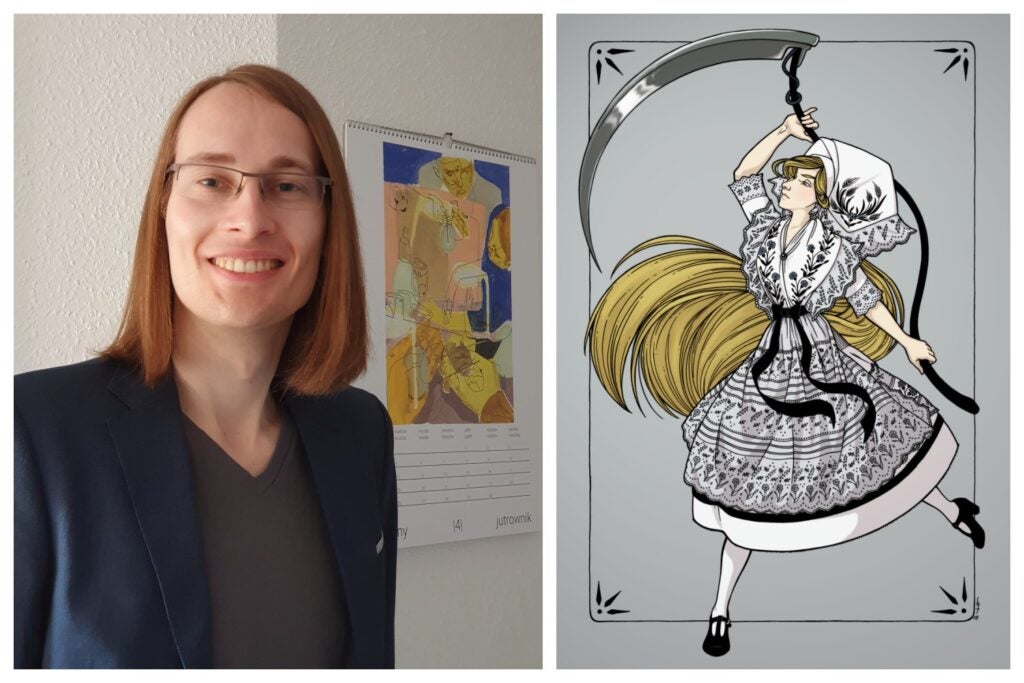
On September 1, alumnus Willi Barthold (PhD, 2020) returned to the German Department to present his lecture entitled “Stimmen aus jenseitigen Dörfern: Warum wir uns in den German Studies mit der sorbischen Literatur befassen sollen.” During this presentation, he argued for including literature written in the Sorbian language in German Studies. He provided historical background on the Slavic minority in Eastern Germany and introduced his audience to some of the key authors in Sorbian literature. A lively discussion followed which centered on issues of minority literature, cultural hybridity and translation. Willi was accompanied by his wife, Emily Barthold, also an alumna of our Department (PhD, 2019). Dr. Barthold is currently Wissenschaftlicher Mitarbeiter (Postdoc) am Institut für Slavistik der Technischen Universität Dresden, Lehrstuhl für Westslavische Literatur- und Kulturwissenschaft.
A Sunshine in the Midst of the Hell ‘Loneliness’: The Extraordinary Group Correspondence of Jewish-Austrian Classmates 1938-1953
April 8, 2022
The German Department welcomed Dr. Jacqueline Vansant on Friday, April 8, 2022, for a presentation and discussion on the group correspondence between teenage Jewish-Austrian classmates beginning in 1938.
Sometime between March and August of 1938, a small group of 15- and 16-year-old schoolboys of Jewish heritage stood on a bridge over the Danube Canal in central Vienna and said good-bye to each other “forever.” Because of the persecution of Austrian Jews, which had begun immediately after the Anschluss in March 1938, was particularly virulent, the boys and their parents knew that they had to flee the new Nazi regime as quickly as possible. When these classmates from the prestigious Franz-Joseph-Gymnasium met for the last time, they did not know what would become of them, but they promised one another that whatever happened they would do their best to maintain ties. The boys’ original promise resulted in an extraordinary group correspondence that stretched over fifteen years and crisscrossed three continents. This presentation provided a history of the correspondence, focusing on the functions it filled for the boys and its significance for exile studies.
Dr. Jacqueline Vansant is professor emerita of German at the University of Michigan – Dearborn. She centered her scholarly work on the constructions of ethnicities, gender, and identities in post-World War II and contemporary Austrian literature, memoirs, and films as well as the image of Austria in Hollywood films and exile studies. Her first book, Against the Horizon: Feminism and Postwar Austrian Women Writers, is a socio-historical study of five Austrian women writers. Her most recent book, Austria Made in Hollywood (2019) is the first scholarly investigation of films set in Austria and produced in Hollywood between 1923 and 1995.
She is currently a Sosland Foundation Fellow at the United States Holocaust Memorial Museum.
Does the German Remembrance Culture Need an Update?
March 30, 2022
Author and journalist Mohamen Amjahid visited the department to provide critical perspectives on how the German society deals with its past and why this could be crucial for the emancipation of vulnerable groups and minorities worldwide. He analyzed white dominated remembrance discourses in Germany and gave new perspectives how a “never again” can be finally implemented in the country that once caused the biggest crime against humanity.
Mohamed Amjahid was born as the son of so-called guest workers in Frankfurt am Main in 1988. He attended school in Morocco until he graduated from high school. He studied political science in Berlin and Cairo and conducted research on various anthropological projects in North Africa. During his studies, he worked as a journalist for taz, Frankfurter Rundschau and Deutschlandfunk. After completing his master’s degree, Amjahid worked as a trainee at the Tagesspiegel in Berlin. Afterwards he worked as a political reporter for the weekly newspaper Die Zeit and Zeit Magazin. He is currently working on several new book projects. Anthropologically and journalistically, he focuses on human rights, equality and upheaval in the USA, Europe, the Middle East and North Africa. On Twitter he writes under the handle @mamjahid (new window), on Instagram @m_amjahid (new window).
In 2021, Mohamed Amjahid published Der Weisse Fleck. Eine Anleitung zu antirassistischem Denken. He is currently holding a fellowship at the Thomas Mann Haus in Los Angeles where he is doing research for his new book project.
This event was co-sponsored by the BMW Center for German and European Studies, the Böll Foundation, and the GU German Department.
The Life and Times of Louise Fatima Bendu Sandimannie Massaquoi
March 18, 2022
The German Department hosted Ms. Vivian Seton for a virtual presentation on the remarkable life of her mother, Louise Fatima Bendu Sandimannie Massaquoi. Dr. Fatima Massaquoi Fahnbulleh was born in Gendema, Sierra Leone, when her father Momolu Massaquoi was King of the Galinas. Her mother was Massa Barlo Sonjo. She grew up in Hamburg (Germany) when her father Momolu Massaquoi was Minister Counsellor to Europe and the League of Nations and Consul General to Hamburg. She excelled in all things German: school, folklore, culture and language.
The love of German led her to teach it at Lane College, Fisk University, and other schools. She took that love back with her to Liberia where she introduced German as a foreign language at the University of Liberia.
Vivian Seton was born in Monrovia, Liberia, to Ernest B. Fahnbulleh and Prof. Dr. Fatima Massaquoi Fahnbulleh. After schooling in Liberia, Germany, and France, she worked as an anchorwoman, news caster, and translator in Liberia while earning a law degree from the University of Liberia. After further schooling in the United States, including in Georgetown’s Linguistics Department, she was the host of ‘Letter to Liberia’ and ‘Your Healthy Family’ at the Voice of America. She also served as an Informative Language Consultant and Trainer to the United States Peace Corps and other federal agencies. She has penned various books and plays, including co-authoring her mother’s memoirs The Autobiography of an African Princess.
Remembering the War: The Field Artist and Panorama Lecturer
April 9, 2021
The German Department welcomed Dr. Vance Byrd (Grinnell College) to a virtual lecture highlighting how German and American field artists for illustrated periodicals during the Franco-Prussian War and the American Civil War played an unexpected yet crucial role in the development of painted panoramas and helped bring about the emergence of the panorama lecturer after Reconstruction. While pictorial realism is typically highlighted as a significant illusionistic feature of panoramas, the panorama lecturer is just as important for an effective immersive experience. Yet panorama lecturers were not neutral narrators. Rather than explaining the actual causes of the American Civil War, they led audiences to interpret the past according to the values of the national family and valor.
Dr. Vance Byrd is the Frank and Roberta Furbush Scholar and Chair of the German Studies Department at Grinnell College. He investigates how literary and print culture intersect with the history of visual media. He has published on topics related to the history of books and periodicals, critical race theory, museum studies, environmental humanities, commemoration, and graphic novels. His first book, A Pedagogy of Observation: Nineteenth-Century Panoramas, German Literature, and Reading Culture (2017) was published in the New Studies in the Age of Goethe series at Bucknell University Press. In addition to articles and book chapters, Byrd has published two co-edited books titled Market Strategies and German Literature in the Long Nineteenth Century (2020) and Before Photography: German Visual Culture in the Nineteenth Century (2021), as well as two journal special issues. He is working on a second monograph, Listening to Panoramas: Sonic and Visual Cultures of Commemoration, and a co-edited collection titled Queer Print Cultures. In 2019, he was awarded the prestigious Andrew W. Mellon New Directions Fellowship, and he will hold residential fellowships at the National Humanities Center, Duke University, and at the Getty Research Institute in 2021–2022.
German Poetry and the Challenges of the Anthropocene
February 27 and 28, 2020
The German Department hosted two events co-sponsored by the DFG-2603 Center for Advanced Studies in the Humanities FOR 2603, “Poetry in Transition,” at the University of Trier.
The first, on February 27, featured a lecture with Dr. Matthias Fechner of the University of Trier titled Diskrepanzen der Grünen: eine Partei zwischen Programmatik, Realpolitik und Projektion.
Since the turn of the millenium, the Green Party has enjoyed a remarkable period of success in Germany. In a number of states (e.g., Baden-Wuerttemberg, Hesse, Rhineland-Palatinate), Green ministers participate in coalition governments. On the federal level, the Green Party has not only shared power in the Schroeder cabinets, but has dominated the political agenda, decisively influencing several progressive policy changes around issues such as nuclear power, immigration, ecological farming, and gender equality.
More recently, however, the party’s political stance has become somewhat more ambiguous, as evidenced for example by the benign paternalism of Baden-Württemberg state minister Winfried Kretschmann; the anti-immigration stance of the Green mayor of Tübingen, Boris Palmer; or the “green consumerism” of the trendy Prenzlauer Berg neighborhood of Berlin. In this talk, Professor Matthias Fechner of the University of Trier analyzed the German Green Party’s ambiguous political stance, not only by examining contemporary policies and policy-making processes but also by scrutinizing the fascinating roots of the alternative movement in Germany, reaching as far back as the early 19th century.
A roundtable panel on German Poetry and the Challenges of the Anthropocene was held on Friday, February 28. In this roundtable, literature professors from the University of Trier explored responses to the Anthropocene in a selection of contemporary texts including Daniela Seel’s voluminous anthology “Lyrik im Anthropozän” (2016) as well as poems by Sabine Scho, Birgit Kreipe, Durs Grünbein and Christian Lehnert. A selection of poems (in the original German) and project descriptions will be circulated prior to the event. The roundtable concluded with a presentation of the Internationale Zeitschrift für Kulturkomparatistik (International Journal for Comparative Cultural Studies), published by the University of Trier since 2019.
About the presenters: A postdoctoral researcher at the Research Initiative Rheinland-Pfalz and a former school principal, Matthias Fechner (Trier) is an associate of the DFG-Center for Advanced Studies in the Humanities FOR 2603, “Poetry in Transition,” at the University of Trier. He holds degrees from the University of Sheffield and the University of Stuttgart. His research is concentrated on contemporary poetry, politics, and the history of education. Friederike Reents (Heidelberg/Trier) studied German literature and philosophy at the University of Heidelberg. Since 2013, she has been a teaching professor at Heidelberg. She is currently director of young researchers in the DFG Center “Poetry in Transition” (since 2018); she also held a research fellowship at Harvard University in 2019. Her research focuses on modern and contemporary literature, aesthetics and poetics, and environmental humanities. Rainer Grübel (Oldenburg) is professor emeritus of Slavic literatures at the University of Oldenburg (Germany). He studied Slavic literatures, German literature and philosophy in Göttingen, Frankfurt, and St. Petersburg, and also taught as full professor in Utrecht and Leiden. His main fields of interest are Russian and German literature and philosophy, theory and axiology of literature, and modern Russian and German poetry. Henrieke Stahl (Trier), Professor for Slavic Literatures at the University of Trier, is the director of the DFG-Center, “Poetry in Transition.” She has degrees from the universities of Trier and Münster. Her interests are concentrated on Russian and Polish literature, Russian and European philosophy, and comparative literature.
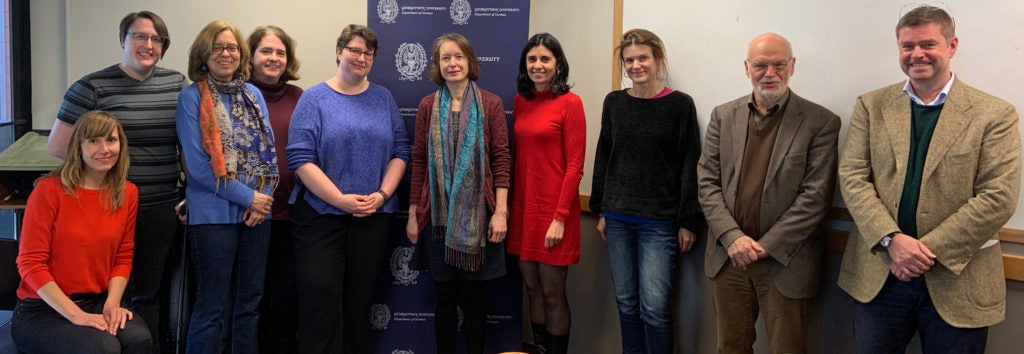
TUCSONICS: Poetry Reading with Max Kade Writer-in-Residence Nika Pfeifer
February 12, 2020
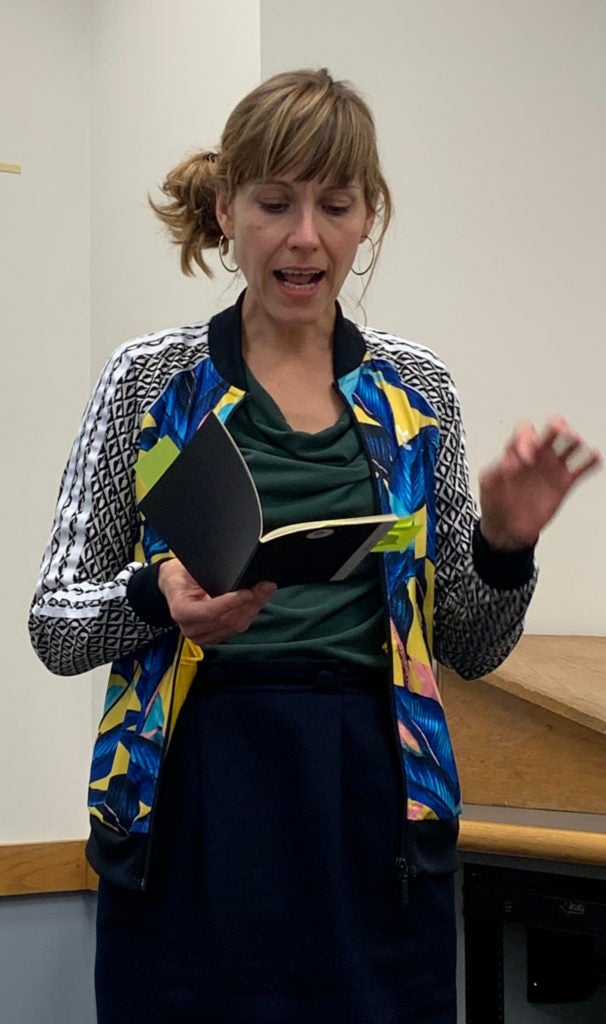
The German Department was pleased to present Dr. Nika Pfeifer and her students from GERM 323, reading her work in both German and English.
In her new poetry collection TUCSONICS, there is a great sensitivity for language. Nika Pfeifer moves between realistic and fantastic perceptions of nature and the world. The title is a portmanteau word (in German: Kofferwort) or blend of the name “Tucson,” a city in the US state of Arizona, and “sonic,” another word for sound.
The combination of both words refers to the fact that Nika Pfeifer has explored the sounds of the US city and its surroundings, and has incorporated her observations into her poems. Mountains, canyons, the vast expanses of the Arizona desert, and the Pacific coast of California also form the multi-layered themes of her poems.
In Pfeifer’s poems, tones also signify color, visuals, concentration, or vastness: a play on words and images is at times concrete, other times mixed with a few dashes of pathos.
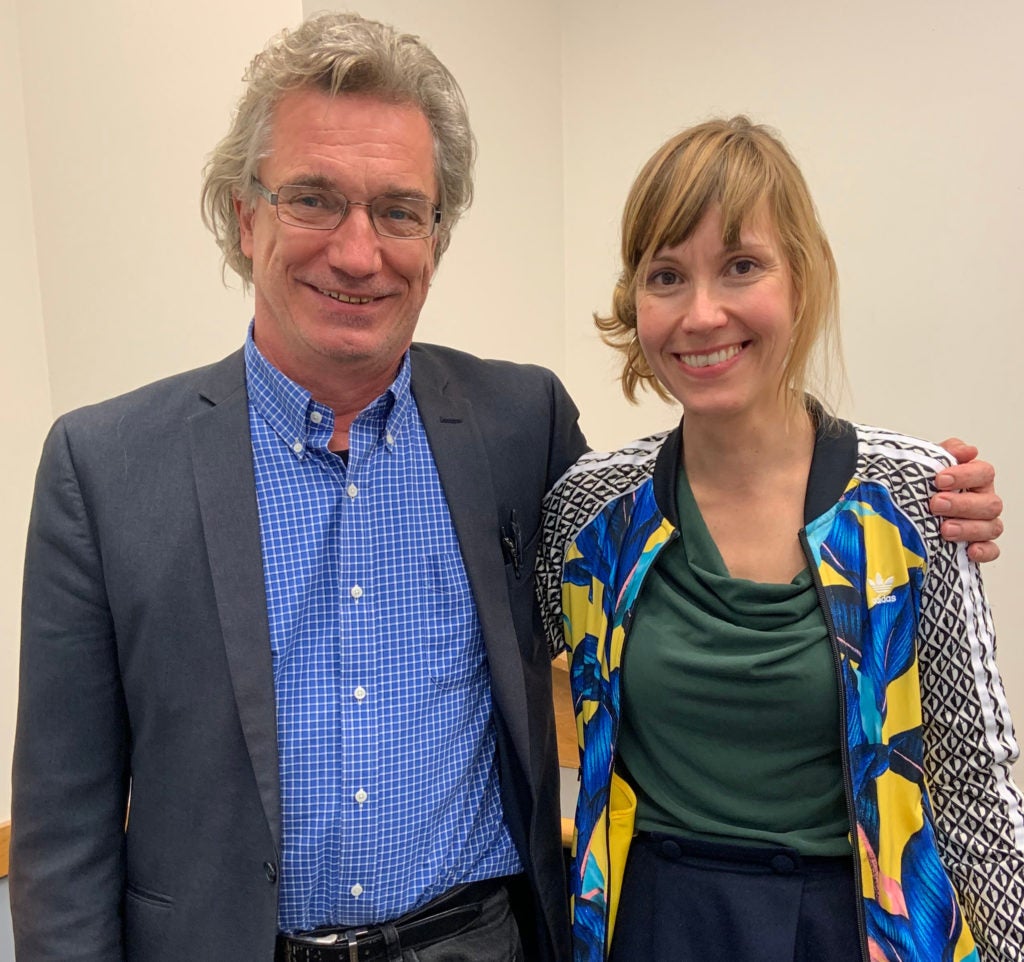
Judith Nika Pfeifer is a writer, sound and visual poet, and performer. She studied political science, communications, and contemporary history (Vienna/Pavia) and has her PhD in Discourse Analysis (Lancaster/Vienna 2017). Currently she works as a writer, poet, and sound artist with matthaei&konsorten, Milena Kipfmüller and Ö1 Kunstradio. Her latest publications are TUCSONICS (hochroth 2019) and Violante (Czernin 2017).
Georgetown University Scholars Series: Dr. Libbie Rifkin
November 15, 2019
The German Department held a talk with Dr. Libbie Rifkin (Department of English), who introduced the field of Disability Studies, discussed the inception and growth of Georgetown’s Program in Disability Studies, which she directs, and addressed the challenges and possibilities of access and disability justice at Georgetown and beyond. She also shared insights from her work on the poetics of care. Positing dependency as a fact of human experience that disability is uniquely positioned to illuminate, while focusing on systems that unequally distribute the labor of care to women and especially poor women of color, this work brings feminist care ethics and disability theory together with a rich archive of contextual materials by poets and other cultural producers along the spectrum of disability identity.
Dr. Rifkin works at the intersection of disability studies and modern and contemporary poetry. Her most recent book is the co-edited collection, “Among Friends: Engendering the Social Site of Poetry” (Iowa, 2013). She has also written extensively about avant-garde poetic careers in the 1950s and 60s, as well as about relations between poetry and institutions, both mainstream and “anti-Establishment” in the post-War era.
Fall of the Berlin Wall: 30th Anniversary Celebration
November 9, 2019
Professors Astrid Weigert and Anja Banchoff of the German Department organized a week-long series of events beginning Monday, November 4, to commemorate the 30th Anniversary of the Fall of the Berlin Wall. Events included a week-long poster display in the ICC Galleria on “Understanding the Border: The Berlin Wall 1961-1989” and a replica Berlin Wall on display in Red Square.
We were also pleased to host Michael J. Mucchetti on Thursday, November 7, for an eyewitness account of the fall of the Berlin Wall, and on November 8, German Department students participated in a BLITZslam! conference on the topic of walls. The students gave 5-minute presentations in either German or English to an enthusiastic audience of peers, graduate students, and faculty.
The week’s events ended on Saturday, November 9, with a “Tear Down the Wall!” cake party in Red Square. Members of the German Club ceremoniously cut the cake made in the shape of the Berlin Wall for a delicious end to the celebration.
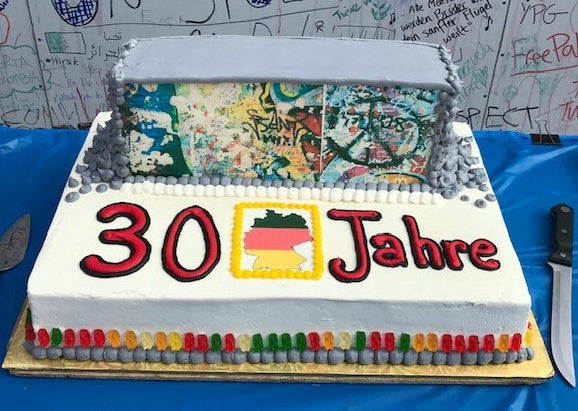
Workshop with Dr. David Kim on Hannah Arendt
October 31, 2019
Dr. David Kim (UCLA) presented a workshop focused on a close reading of chapter 9 of Hannah Arendt’s The Origins of Totalitarianism, “The Decline of the Nation-State and the End of the Rights of Man.” The aim of this workshop was to closely examine Arendt’s differentiation between the rights of man as post-Enlightenment principles and the emerging international human rights through the United Nations during the post-World War II era. The conversation also interrogated her controversial emphasis on national citizenship as the sole guarantor of rights for displaced persons.
Dr. David Kim teaches in the Department of Germanic Languages at the University of California, Los Angeles. He is also a faculty affiliate in Global Studies at the UCLA International Institute. His scholarly interests range from the age of Enlightenment to the present day with emphases on postcolonial and translation studies, digital humanities, international human rights, and political and cultural theories. He is the author of Cosmopolitan Parables (Northwestern University Press, 2017) and the co-editor of The Postcolonial World (Routledge, 2016) and Imagining Human Rights (De Gruyter, 2015). His current book projects include a co-edited volume on global histories of German literature and an edited volume, titled Reframing Postcolonial Studies and forthcoming with Palgrave Macmillan. His digital humanities project is WorldLiterature@UCLA.
Diary Goes Digital: The Edition of Harry Graf Kessler’s Diary Online
September 27, 2019
The German Department was pleased to host Dr. Roland Kamzelak, Assistant Director and Leader of Development at the Deutsches Literaturarchiv Marbach, for a talk on the digitization of the diary of Harry Graf Kessler.
Harry Graf Kessler was one of the most remarkable figures of Europe around 1900 and his extensive diary is like an eye-witness report of historical events and of developments in art and in literature. The 16,000 pages have been edited and published in a hybrid print and digital edition, and this talk explained the inner workings of the edition including the underlying data, encoding, and digital publication tools, and will discuss the value of the hybrid approach.
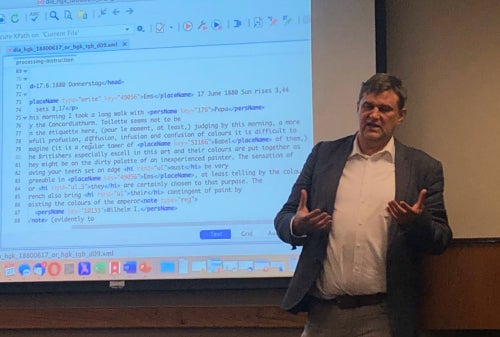
Simply a Small Room – How Digital is a University? Lecture with Dr. Michael Jäckel
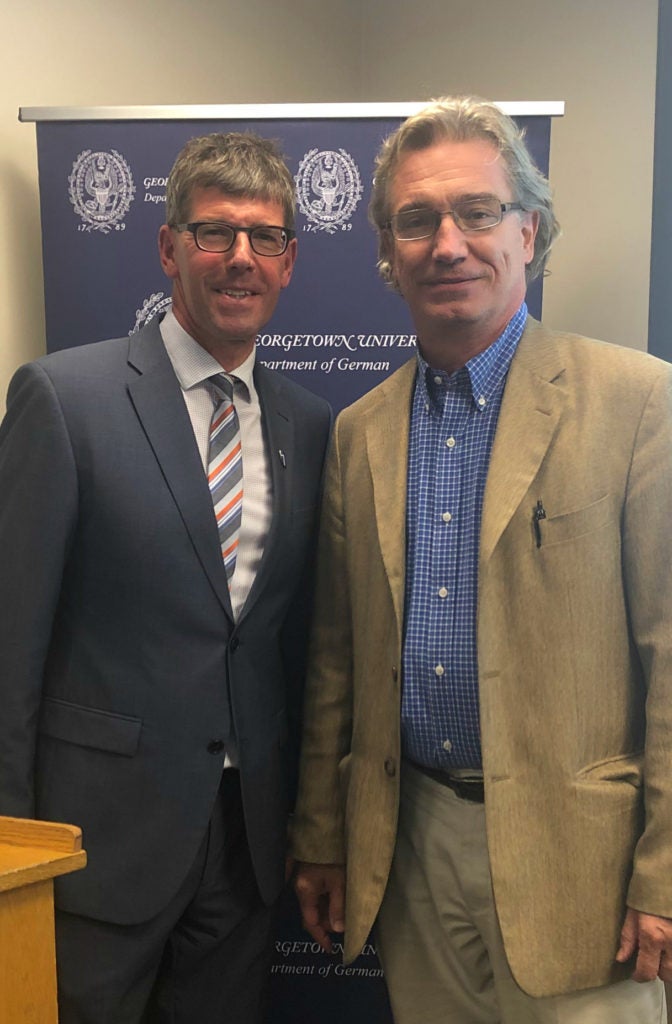
September 20, 2019
Dr. Michael Jäckel, President of the University of Trier, spoke to German department students and faculty on higher education and digitization, specifically how universities are preparing themselves for a digitized landscape.
Dr. Jäckel is a sociologist with a research focus on the sociology of media and consumption. Under the auspices of the Hochschulforum Digitalisierung, he is the chair of the Stakeholder-Dialogue, and a member of the German Council for Scientific Information Infrastructures.
For What It’s Worth: Reading with author Thorsten Nagelschmidt and translator Tim DeMarco
April 24, 2019
The German Department was pleased to present a reading and discussion with author Thorsten Nagelschmidt and translator Tim DeMarco from the novel For What It’s Worth (Was kostet die Welt).
What to do with the windfall? – When his father dies, bohemian bartender Meise takes the unexpected inheritance and embarks on a journey. The plan? Spend, not save. He swore to himself he would do it all differently than his father. But after road-tripping across America and partying all over Europe, he doesn’t seem to fit back into his old life in Berlin. With the remaining money he sets out on one last trip: to a vineyard in rural West Germany. There he is confronted with a culture shock unlike any other and is forced to ask himself the questions about his own life he’s been trying to avoid. Tragic yet entertaining, with acute observations and no shortage of black humor, Nagelschmidt allows his (anti)hero to fail – by his own hand or others’ is up to the reader to decide. Author and translator read from the novel in German and English, and discussed themes of the novel as well as the translation process.
Thorsten Nagelschmidt, born in 1976 in West Germany, is an author, musician, and artist. Until 2009, he was the singer, lyricist, and guitarist of the band Muff Potter. He has had three novels and a collection of stories and photographs published, most recently Der Abfall der Herzen, published by S. Fischer Verlag in 2018. Nagelschmidt lives in Berlin.
Translator Tim DeMarco is a teacher, translator, and writer. He earned his bachelor’s degree from Georgetown University and his master’s degree from Middlebury College. He currently lives in New Jersey, where he teaches at the high school and university level.
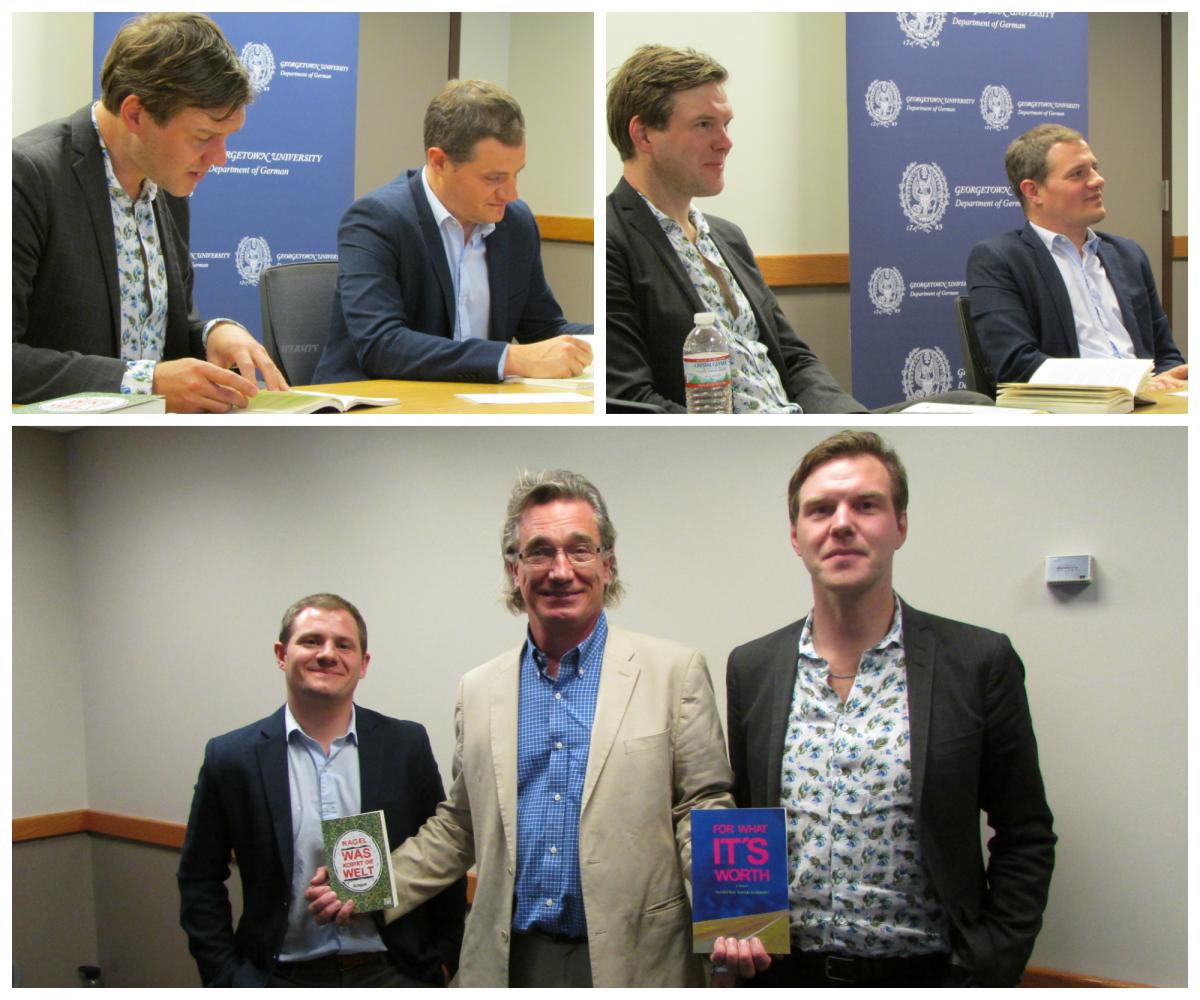
Lecture with Dr. Andrea Geier, Max Kade Visiting Professor
April 2, 2019
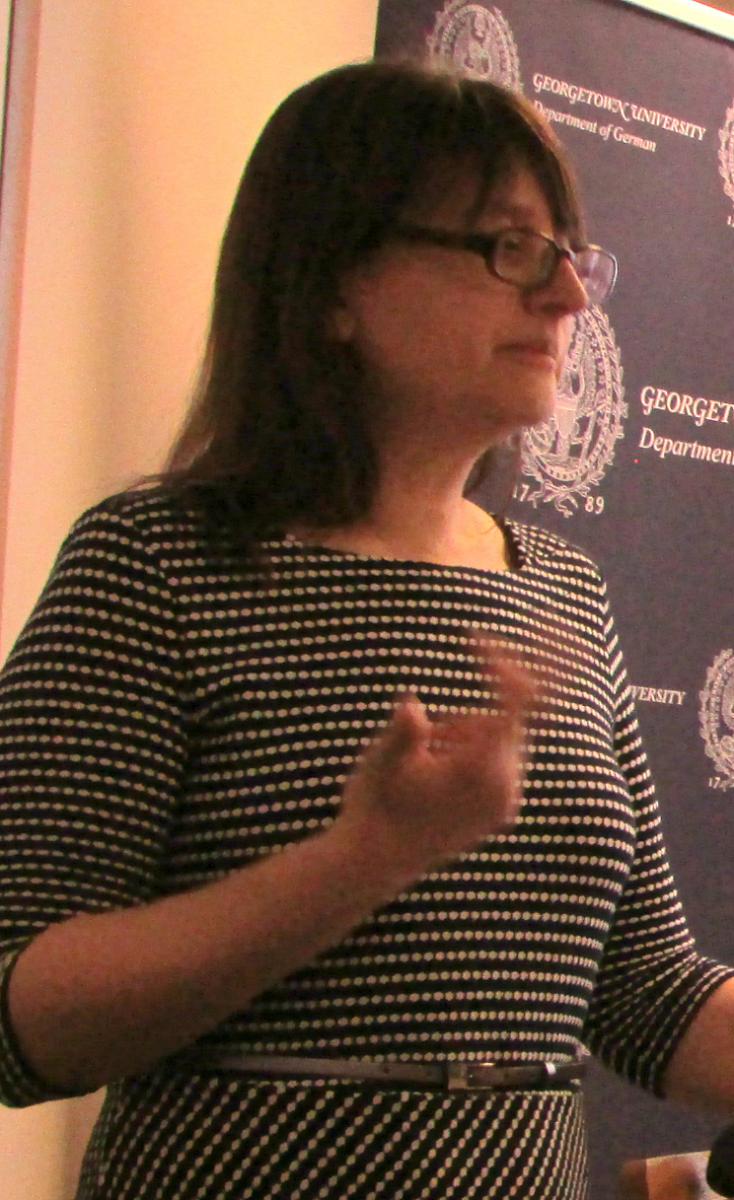
Dr. Andrea Geier presented a lecture in German titled “Als Geisteswissenschaftler*in auf Twitter? Über Wissenschaftskommunikation in den sozialen Medien.” Im Unterschied zu wissenschaftlichen Blogs werden Aktivitäten von Wissenschaftler*innen auf Twitter vielfach skeptisch gesehen oder für sinnlos erklärt. Wissenschaft in 280 Zeichen? Tatsächlich gibt es auf Twitter alles: Von einzelnen Lektüreeindrücken belletristischer Texte bis zum Lesekreis, von der Ankündigung einer Tagung bis zur Livekritik, von freundlichen Hinweisen auf Neuerscheinungen bis zu harschen Verrissen, von Kommentaren zur Bildungspolitik bis zu Auseinandersetzungen über Forschungsergebnisse. Die Frage ist: Wie wird man ein produktiver Teil davon?
Andrea Geier is the 2019 Max Kade Visiting Professor in the German Department. She is a Professor for German Literature and Gender Studies and has been directing the Center for Postcolonial and Gender Studies (CePoG) at the University of Trier (a platform for scholarly approaches that critically analyses constructs of gender, ethnic, and national identity) since 2010. Her research interests are on German contemporary literature and discourses of anti-Semitism, gender and alterity in contemporary German drama, and cultural and literary gender studies. Her publications include: Gewalt und Geschlecht. Diskurse in deutschsprachiger Prosa der 1980er und 1990er Jahre (2005); Wider die Frau. Zu Geschichte und Funktion misogyner Rede, co-edited with Ursula Kocher (2008); Konkurrenzen, Konflikte, Kontinuitäten. Generationenfragen in der Literatur seit 1990, co-edited with Jan Süselbeck (2009); and Spielräume des Anderen. Geschlecht und Alterität im postdramatischen Theater with Nina Birkner and Urte Helduse (2014).
2019 Blitzlicht Conference
March 29, 2019
The German Department hosted for the first time the Blitzlicht Conference, conceptualized and organized by the department’s graduate students. The conference featured 5-10 minute presentations from undergraduate and graduate students on any topic related to German language, literature, culture, or history and presentations were given in German or English.

2019 GRADNASFLA Symposium: Systemic Functional Linguistics Across Contexts
February 22-24, 2019
The German Department at Georgetown University hosted the 2019 GRADNASFLA Symposium: Systemic Functional Linguistics Across Contexts on February 22-24. Over the three days, the symposium featured four keynote speakers, including Mary Schleppegrell (University of Michigan), Zak Lancaster (Wake Forest University), Nigel Caplan (University of Delaware), and Heidi Byrnes (Georgetown University). Conference attendees also participated in a workshop led by Ruth Harman and Nicole Siffrinn (University of Georgia) on “An Embodied Teaching/Learning Cycle: Culturally Sustaining SFL Praxis.” The conference program can be viewed online.
This symposium was organized by Dr. Marianna Ryshina-Pankova, with the help of Sandra Digruber and Justin Quam, German Department PhD candidates. The Graduate Student North America Systemic Functional Linguistics Association (GRADNASFLA) is a student-led organization acting with the support of the North American Systemic Functional Linguistics Association.
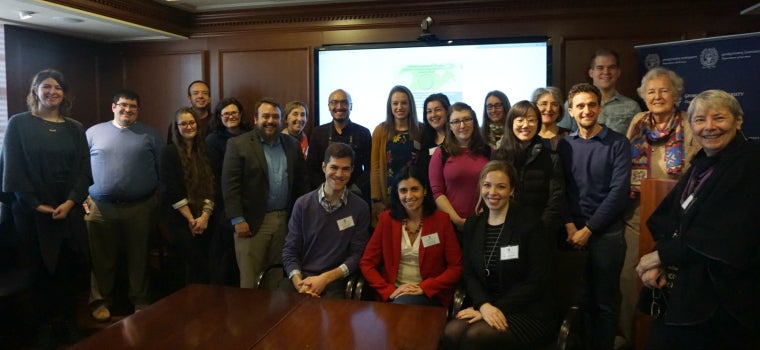
Decolonizing the Museum – Transnational Comparisons
November 9-10, 2018
In 2016, the National Museum of African American History and Culture opened in Washington, DC, against the background of intense debates about public memorialization of slavery and the Civil War, and calls for reparations. Meanwhile, a growing number of exhibitions in German museums have begun to tackle German colonial history, including the genocide of Hereros and Namas in what was then German-Southwest Africa, and explore its legacies in a culturally diverse society. Historians, curators, artists, and activists in both countries are at the center of discussions about dire pasts, the politics of collecting and exhibiting, and the possibility of repair.
During this conference, scholars and curators from the USA and Germany spoke about recent efforts to create postcolonial approaches to cultural heritage, cosmopolitan pedagogy, and museums’ engagement with postcolonial communities.
The conference included a keynote by Dr. Silke Arnold-de Simine (University of London), a prominent scholar of museum studies; two academic panels presenting case studies on exhibiting the colonial past from Germany and slavery in the USA; and two roundtables with scholars from Georgetown University about GU’s efforts to come to terms with the university’s history of slavery, and with artists working in German museums, respectively. The conference took place Friday, November 9, at Georgetown University and Saturday, November 10, at Howard University.
The conference was organized by Prof. Katrin Sieg (Georgetown University) and Prof. Ana-Lucia Araujo (Howard University).
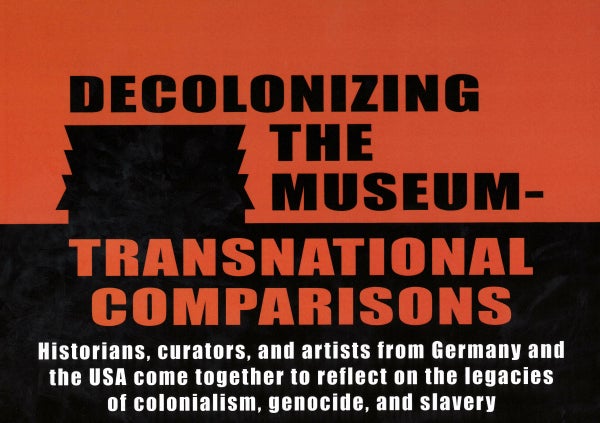
Arts of Unconditioning: On Romantic Science and Poetry
October 29, 2018
Georgetown University’s German Department hosted a lecture by Dr. Gabriel Trop (Univ. of North Carolina) titled “Arts of Unconditioning: On Romantic Science and Poetry.” This talk explored the contours of the romantic concept of a “new mythology” (Schlegel, Novalis, Schelling) as an attempt to “uncondition” Kantian transcendental operations that sought to secure knowledge, morality, and judgment through discovering their conditions of possibility. The unconditioning power of this new mythology is produced by weaving the scientific, material, and physical operations of an absolute of nature beyond the human into the folds of the destiny of the human; romantic poetry itself, however, reflects critically on the emancipatory potential of such operations, above all in the work of Karoline von Günderrode.
Gabriel Trop is Associate Professor of German at the University of North Carolina in Chapel Hill. His research tends to focus on the relationship between literature, philosophy, and science, with a special emphasis on poetics and aesthetics. Most recently, he co-edited the volume Posthumanism in the Age of Humanism: Mind, Matter, and the Life Sciences after Kant with Edgar Landgraf and Leif Weatherby, published in 2018 by Bloomsbury Press.
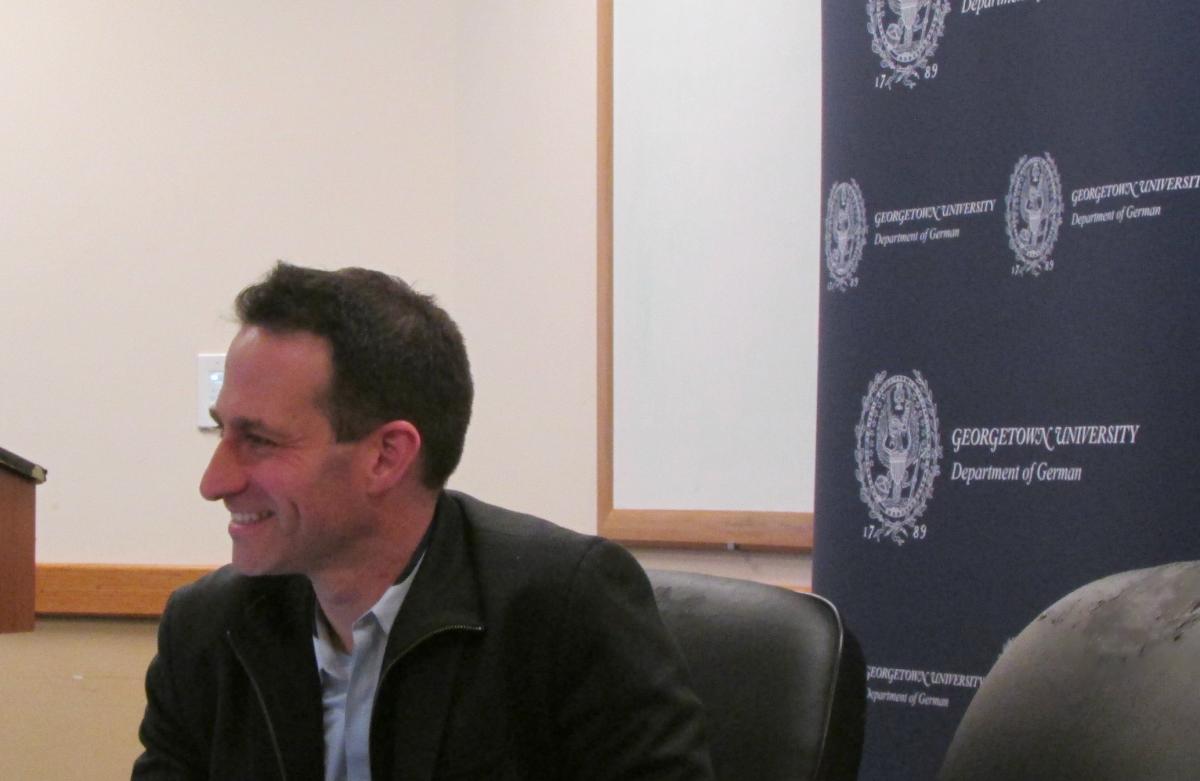
Performing Language in the Foreign Language Classroom – An Experiential-Interactive Approach
September 14 and 15, 2018
The German Department and the Faculty of Languages and Linguistics hosted a two workshops titled “Performing Language in the Foreign Language Classroom – an Experiential-Interactive Approach” on Friday, September 14 and Saturday, September 15. These workshops were led by Dr. Sabine Gross, Professor of German and Affiliate Professor of Theater and Interdisciplinary Theater Studies at the University of Wisconsin-Madison. Friday’s event was open to all FLL faculty and graduate students, and the content of Saturday’s workshop was tailored for the German Department specifically. During the workshops, Dr. Gross explored how learning and speaking a foreign language is a process of discovery that can produce anxiety and stress in students. Relaxing the usual emphasis on meaning and conventional verbal communication allowed the participants to experience language in new ways that can contribute to learner enjoyment and success in the classroom.
The workshops offered participants a different way of engaging with language that can be utilized at any level of language instruction. Participants acquired strategies suitable for a wide range of applications in the foreign-language classroom, from the first week of instruction through advanced literature classes. Friday’s workshop also incorporated examples from a wide variety of foreign languages, based on participants’ language backgrounds.
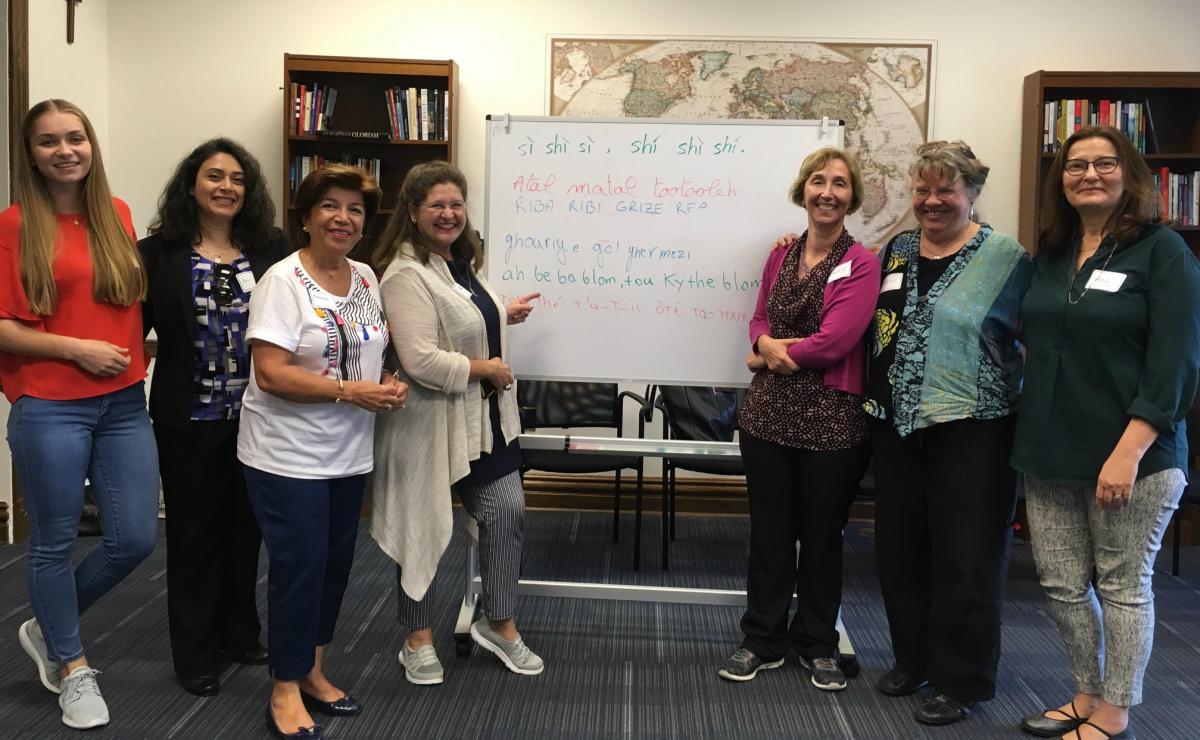
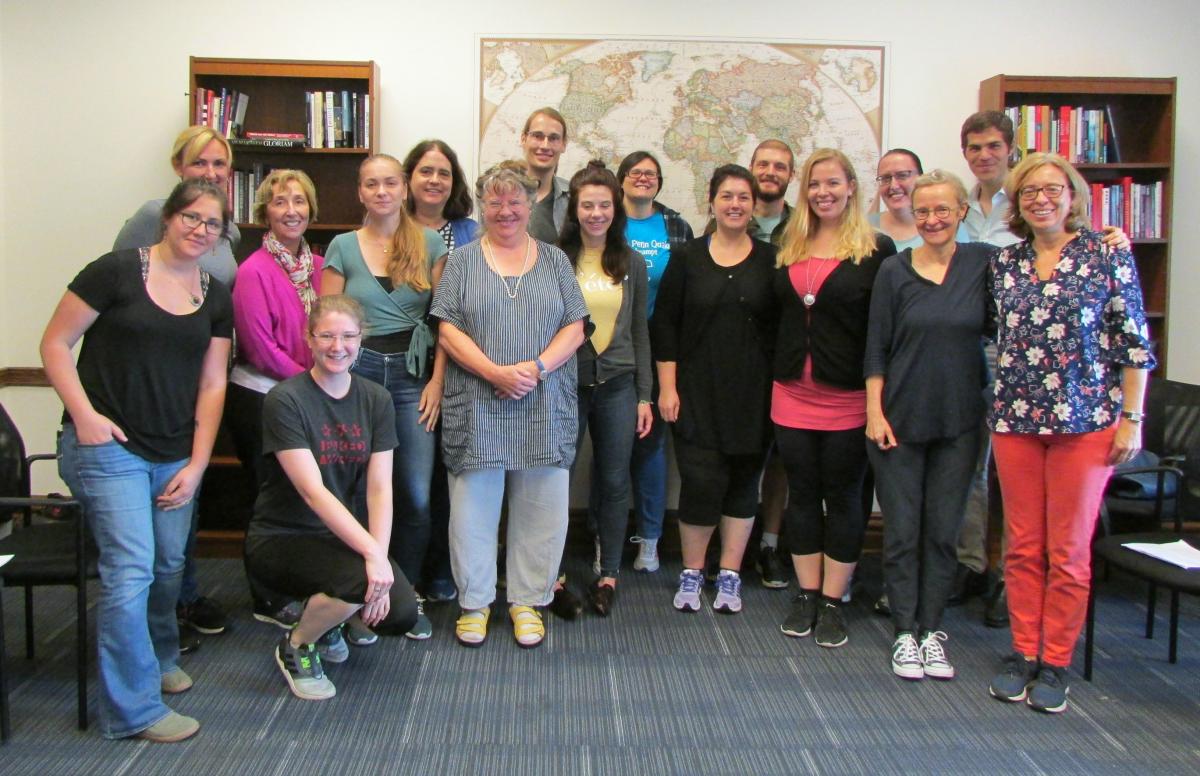
Disorganizing Genre in Maren Ade’s Screwball Tragedy Toni Erdmann: Lecture with Dr. Hester Baer
March 13, 2018
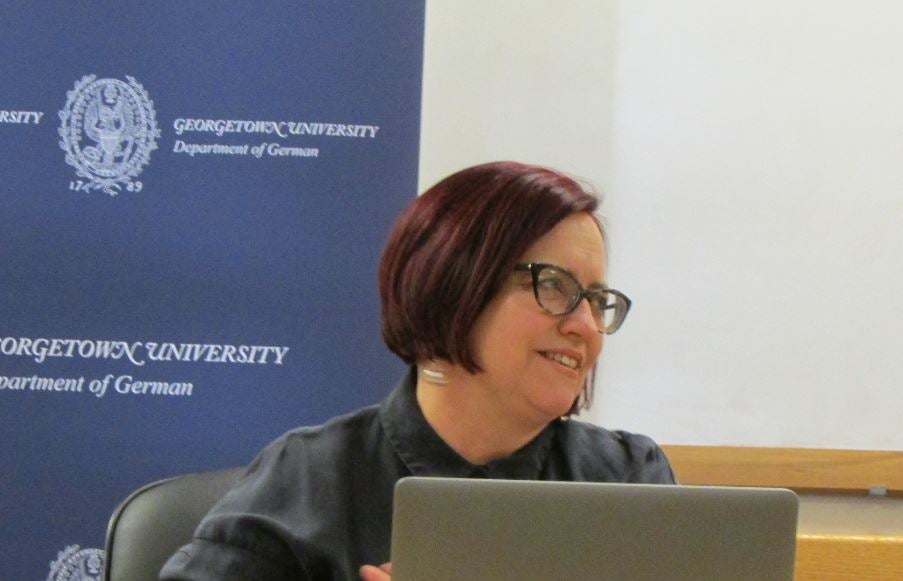
This talk investigated the relationship between changing socioeconomic contexts and the emergence of new aesthetic forms in contemporary German cinema, focusing particularly on the critically acclaimed box-office hit Toni Erdmann (2016), written and directed by Maren Ade. Dr. Baer contended that Ade’s film is a landmark in the cinematic representation of neoliberalism. In its narrative, the film strives to depict the contemporary economy in all of its facets and employs a father-daughter generational narrative to track the transformations of ordinary life in the present. As she suggests, Toni Erdmann is a “screwball tragedy” reflecting on a formal level the insecurity of the present that forms the matrix of the narrative. Her analysis attends particularly to Toni Erdmann’s sustained focus on the way economic transactions shape and are shaped by normative conceptions of nation, ethnicity, race, class, gender, and sexuality today.
Hester Baer is Associate Professor and Head of Germanic Studies at the University of Maryland, where she also serves as a core faculty member in the Film Studies and Comparative Literature programs. Baer has published widely on gender and sexuality in film and media; historical and contemporary feminisms; and German literature and culture. She is the author of Dismantling the Dream Factory: Gender, German Cinema, and the Postwar Quest for a New Film Language (2009) and the co-editor of German Women’s Writing in the 21st Century (2015). Baer is currently completing a book, German Cinema in the Age of Neoliberalism, 1980-2010, and she is the co-editor of a special issue of the feminist film journal Camera Obscura on “German Women’s Film Authorship in Neoliberal Times,” which will appear in Fall 2018.
My Most Prized Possessions: A reading with Max Kade Writer-in-Residence Christopher Kloeble
February 23, 2018
On Friday, February 23, the Georgetown German Department’s Max Kade writer-in-residence Christopher Kloeble held a reading of his more recent publications. From his memoir, Home Made in India, Kloeble recounted a childhood spent as an outsider; a Bavarian who could neither speak Bayrisch nor kick a soccer ball. It was in these harrowing yet formative years that Kloeble discovered his penchant for humor, and, by extension, storytelling. He also highlighted an entertaining account of his wife’s upbringing in India – now a second home for Kloeble – which serves to both inform and engage the reader in a personal journey. After ending the first chapter of Home Made in India, Kloeble imparted upon us that he has never considered himself a formal author. As he puts it, “authors string words and sentences together, I feel as if I am strung along by them” (Kloeble, 2/23/18, translated). One finds this hard to believe when listening to a few excerpts from his novel Almost Everything Very Fast. A riveting take on the classic coming-of-age story, Almost Everything takes two outsiders, Albert and his father Fred, on an adventure into the past in an effort to reconstruct Fred’s memory and thereby give Albert, a veritable orphan, some sense of belonging and family. (Evan Thomson, COL’18)
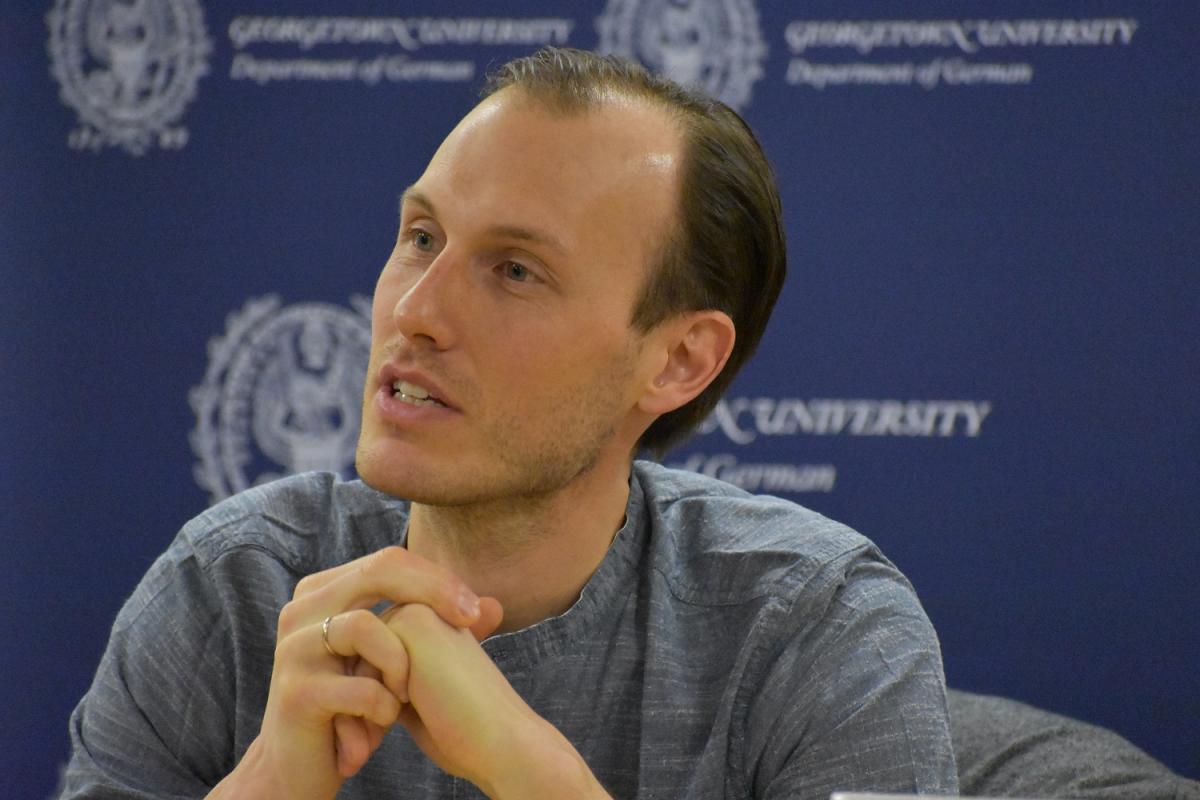
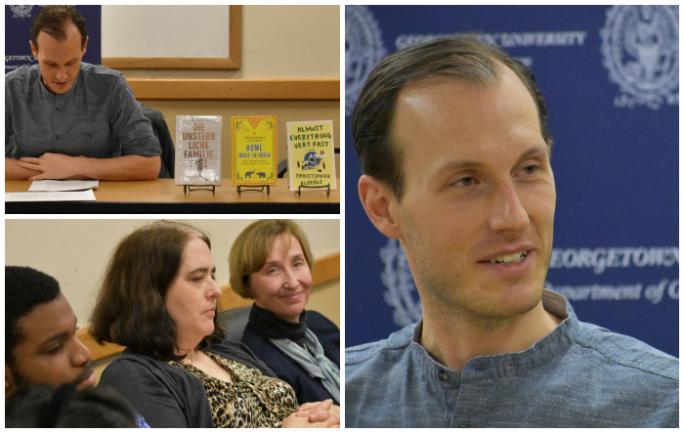
From the Total Artwork to Multimodal Scholarship (or How a Modernist found Residence in Non-Linear Thinking): Lecture with Dr. Anke Finger
January 19, 2018
Digital scholarship, if understood not only as working with digital methodologies and tools, but also as communicating and publishing beyond print media, challenges the traditionally trained humanist: how is the literary scholar to navigate the plethora of media and media affordances? What about the variety of literacies required to “read” and produce such scholarship? How to negotiate the possible semiotic playing fields? “From the Total Artwork to Multimodal Scholarship” explored these questions by highlighting the making of “Flusser 2.0: Remediating Ideas, Reimagining Texts” and by connecting the interart practices in modernism with some of today’s media convergences.
Anke Finger is a Professor of German and Media Studies and Comparative Literature at the University of Connecticut and Section Head of German Studies. She also serves as Assistant Director at the Humanities Institute, in charge of Digital Humanities and Media Studies. She is currently working on three larger projects: a multimodal e-book entitled “Flusser 2.0”; a monograph on the avant-gardes and sensory perception; and the Conviction Project, placing the concept of “conviction” at the intersection of intercultural communication and media studies.
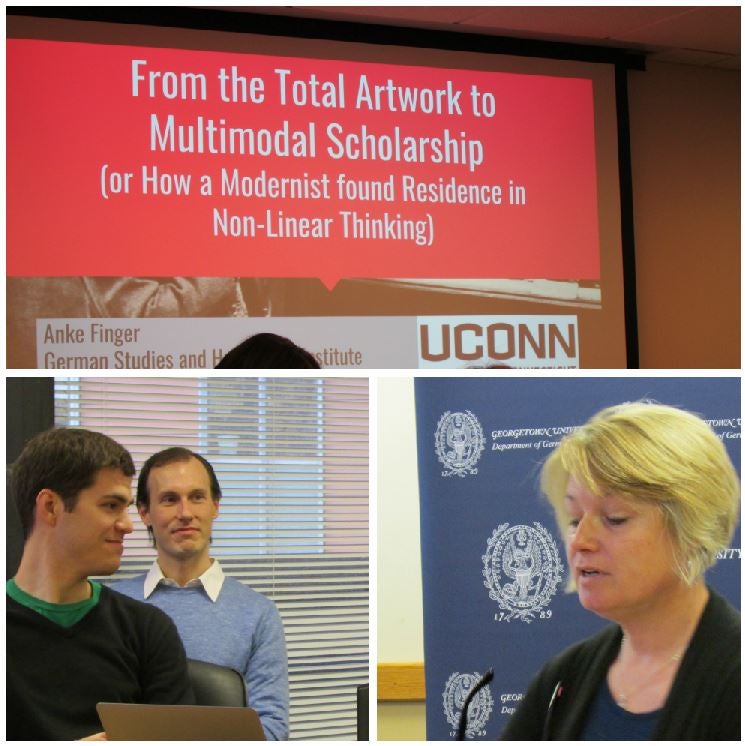
Julius Posener (1904-1996): Surprising Witness to Postwar German Suffering – Lecture with Dr. Irene Kacandes
October 16, 2017
Born in Berlin to an assimilated Jewish family, Julius Posener studied architecture with Hans Poelzig and worked in the office of Erich Mendelsohn. When Hitler came to power, he emigrated to Paris and then to Palestine. In 1941, he enlisted voluntarily in the British army, fighting in North Africa and Italy, and reentering his native Germany in January 1945. Witnessing the profound destruction from the Allied aerial bombings of the area around and in Cologne, Posener also observed the increasingly weakened condition of the locals as food rations were drastically cut. His sense that the Germans were on the verge of starvation led him to draft In Deutschland 1945-46, and to self-publish it in Jerusalem in 1947. In this talk, Dr. Kacandes will give an account of this remarkable book, considering Posener’s actions under the rubric of “co-witnessing,” a concept she has developed to analyze those who take on the burden of others’ suffering (Kacandes 1997, 2009, 2017). By considering the ethical complexities of Posener’s position, she aims to spark discussion of whose suffering we are called to co-witness today.
Irene Kacandes holds The Dartmouth Professorship of German Studies and Comparative Literature at Dartmouth College in Hanover, NH. Author or editor of eight books, she specializes in trauma, memory, life writing, and Holocaust studies. Her recent publications include Let’s Talk About Death (written with Steve Gordon, 2015) and Unmapping Eastern Europe (edited with Yuliya Komska, 2017). Kacandes runs the “Interdisciplinary German Cultural Studies” book series at de Gruyter Verlag in Berlin and is immediate Past President of the German Studies Association. She is currently a Norman Raab Research Fellow at the Mandell Center for Advanced Holocaust Studies at the USHMM here in Washington, DC.
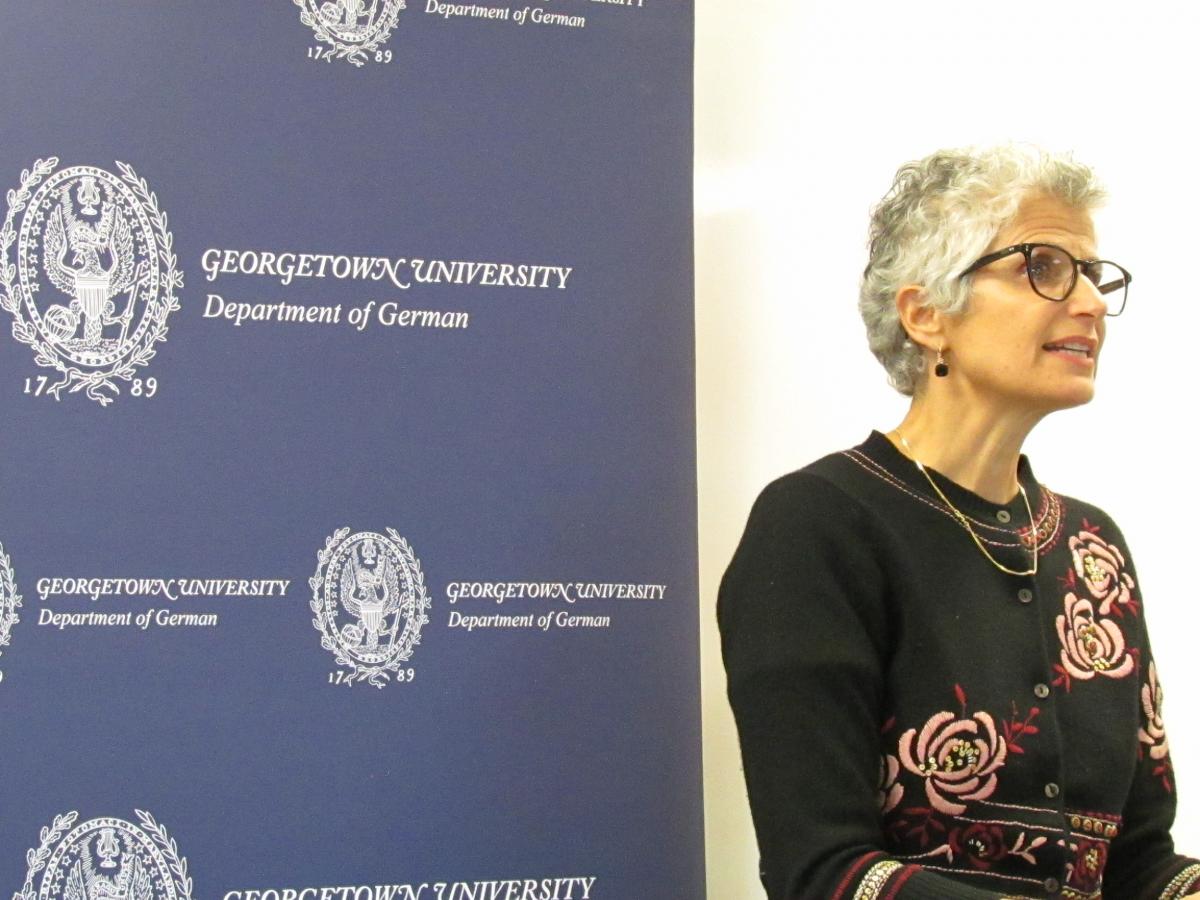
Wie Dekolonisiert man deutsche Geschichte im Museum? Lecture with Dr. Katrin Sieg
September 25, 2017
The presentation given by Dr. Sieg examined the recent special exhibition on German Colonialism at the German History Museum in Berlin to ask how the museum choreographs visitors’ encounter with a violent colonial past lodged in material objects. It also proposed criteria for assessing the museum’s effort to facilitate the labor of mourning the colonial past, as well as argued that transforming museum pedagogy must be part of decolonizing the museum.
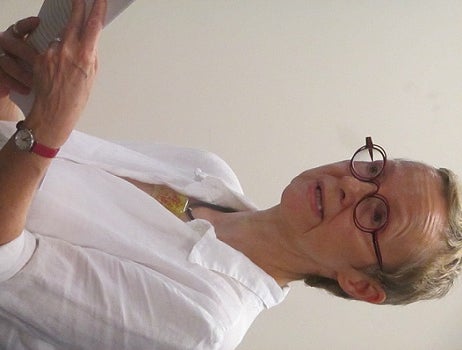
Poetry Reading with Dr. Michael Speier
September 15, 2017
In his new poems Michael Speier showed how works of art become words, visiting artists such as Vermeer, Botticelli and Renoir. Oskar Kokoschka paints Chancellor Adenauer on Lake Como and Mark Rothko’s famous Red reminds one of Berlin’s culinary specialty: the currywurst. A number of texts were begun in 2015 by Speier as Max Kade’s Writer-in-Residence at the Georgetown University in Washington, DC.
Michael Speier lives as an author and translator in Berlin. He has published numerous poems, lyric anthologies and translations of contemporary poetry from other languages. He teaches literary studies at universities in Germany and the USA, is the founder and editor of the literary magazine ‘Park’ and the ‘Paul Celan Yearbook,’ was head of the Poetry Festival Milan 2007, and is the editor of PO&SIE (Paris).
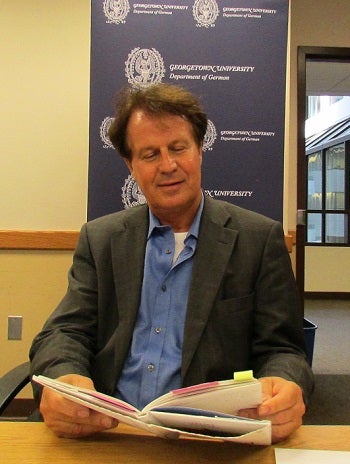
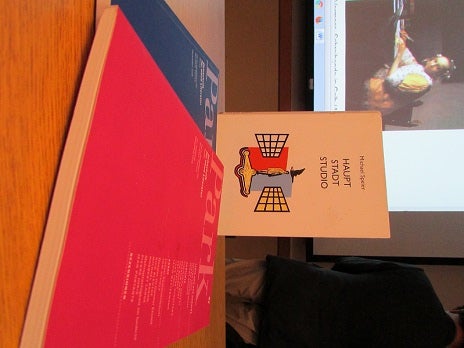
Private Lives/Public Virtues: Transatlantic Perspectives on the Long Eighteenth Century
April 28, 2017
Scholars have long focused on the “long eighteenth century” in Europe and America as a time of radical transformation, both in the realm of public life and vis-à-vis notions of the family, gender, and the individual. In a series of “lightning lectures,” graduate students from the “Private Lives/Public Virtues” seminar reflected creatively on the transformation of the public and private spheres in German-speaking Europe and the United States from the eighteenth century to the present day. In the spirit both of the Enlightenment and of the course’s public-humanities focus, these presentations were designed for a general audience, as they sought to entertain as well as enlighten. The symposium was in English, and it focused on three main topics: Women, Religion and Enlightenment: Luise Gottsched’s Pietism in Petticoats, Enlightenment Goes Transnational: Publics and Debates, and Enlightenment 2.0: Media, Technologies, Interventions.
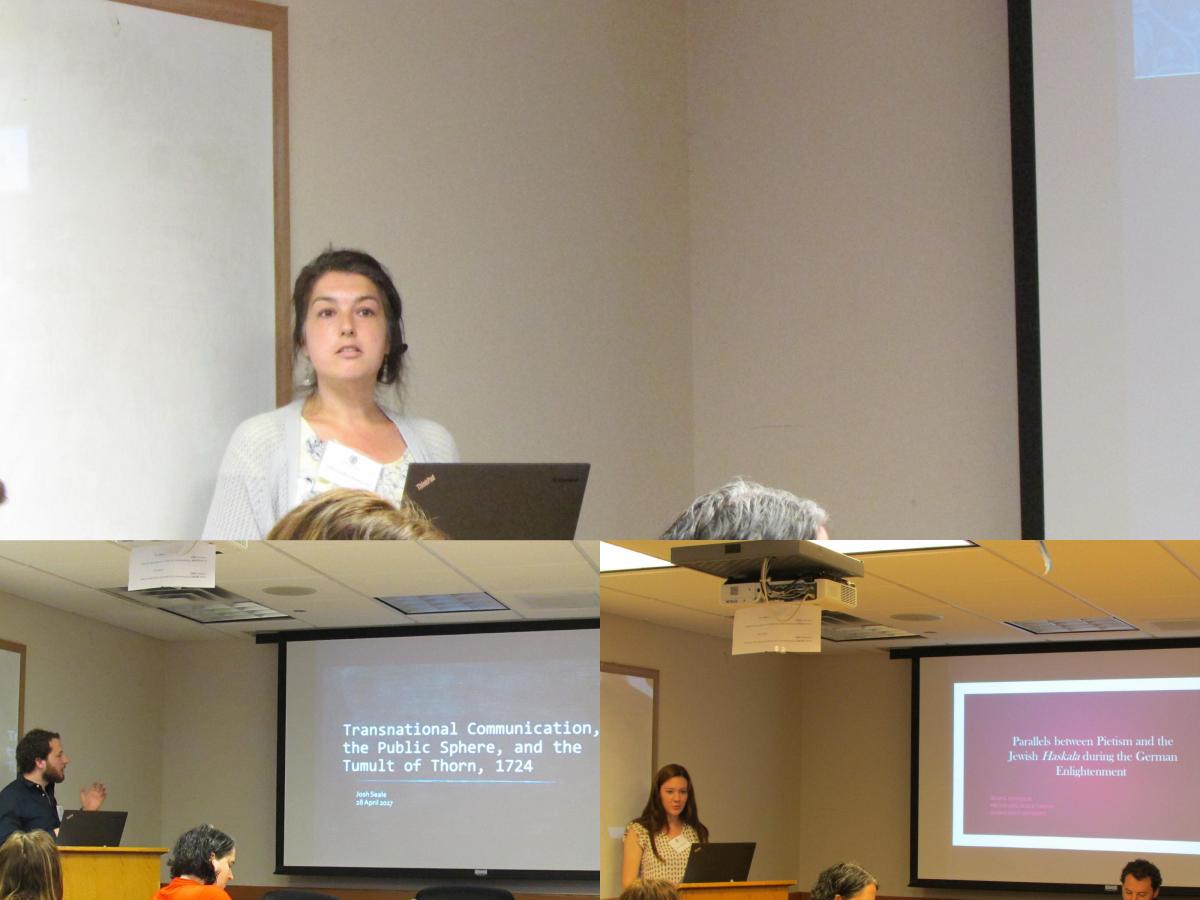
Two Events with Professor Naoko Taguchi
April 7, 2017
The German department, in conjunction with the FLL, was pleased to sponsor two events with Professor Naoko Taguchi on April 7, 2017. Dr. Taguchi hosted a hands-on workshop titled “Teaching Pragmatics: What, Why & How,” directed toward second language teachers (both faculty and graduate students), and looked at ways to incorporate second language pragmatics in teaching. She then gave a presentation as part of the Department of Linguistics Speaker Series, which focused on theoretical foundations and empirical findings in L2 comprehension of indirectness. She compared and contrasted three theories of pragmatics that explain the mechanisms and processes of indirectness comprehension: Grice’s (1975) cooperative principle, Sperber & Wilson’s (1986, 1995) Relevance Theory, and Kecskes’s (2014, 2016) socio-cognitive approach. Although all these theories place the speaker’s intention in the central focus of theoretical assumptions, they differ in their explanations about how the speaker’s intention is recognized and understood. Under each theoretical paradigm, Dr. Taguchi also presented her past and current work on L2 comprehension of implicature, sarcasm, and intercultural communication. She also discussed whether existing findings lend support to the theoretical paradigms, as well as what consistencies and inconsistencies have emerged in the literature.
Naoko Taguchi is an Associate Professor in the Modern Languages Department at Carnegie Mellon University where she teaches courses in Second Language Acquisition and Japanese language & culture. Her primary research area is pragmatics. Her current projects include technology-enhanced pragmatics teaching, intercultural pragmatics, pragmatics learning in a study abroad context, heritage learner pragmatics, and intercultural development in English-medium universities. She has written and edited several books, most recently Second Language Pragmatics (2017, Oxford University Press; co-authored with Carsten Roever). She is the co-editor of Journal of Multilingual Pragmatics and serves/has served on the editorial board for the Modern Language Journal, Language Teaching, Japanese SLA, Study Abroad Research in Second Language Education and International Education, and Studies of Chinese Language Teaching Journal. She was a research fellow at Waseda University in Tokyo (2012) and also taught in an international university in Japan and Qatar.
Österreich-Tage: Events for Undergraduate German Students and Professors
March 31, 2017
The Österreich–Tage event started off on Friday, March 31, with a two-hour presentation and discussion session led by Julia Ruck, Dr. Stefan Krammer and Gerti Zhao-Heissenberger with an audience of undergraduate students from Georgetown University, the Catholic University and George Washington University. There were two sections to this undergraduate portion, focusing first on advertising in Austria and then on the new film and literature movement in Austria. Following this discussion, professors from the DMV area came to Georgetown University for the start of a weekend focused on teaching about Austria. Dr. Krammer gave an overview of some of the more important works of literature and film produced in Austria in recent years before the participants headed to the Austrian Embassy to hear from a variety of Austrian government officials, who shared in-depth information about their country.
On Saturday, April 1, the participants reconvened at Georgetown University and started the day off with a discussion and workshop on how to teach Austrian literature to undergraduate students learning German. This was followed by a workshop on Austrian advertisements, their importance culturally, and how to interpret and make them relevant in teaching a German course. Finally, Gerti Zhao-Heissenberger spoke at length about the cultural and historical importance in Austria of the café culture and how to explain it and make it relatable to students. The evening concluded with a closing dinner at Kafe Leopold, an authentic Austrian restaurant in Washington DC, which was a fitting end to a productive weekend.
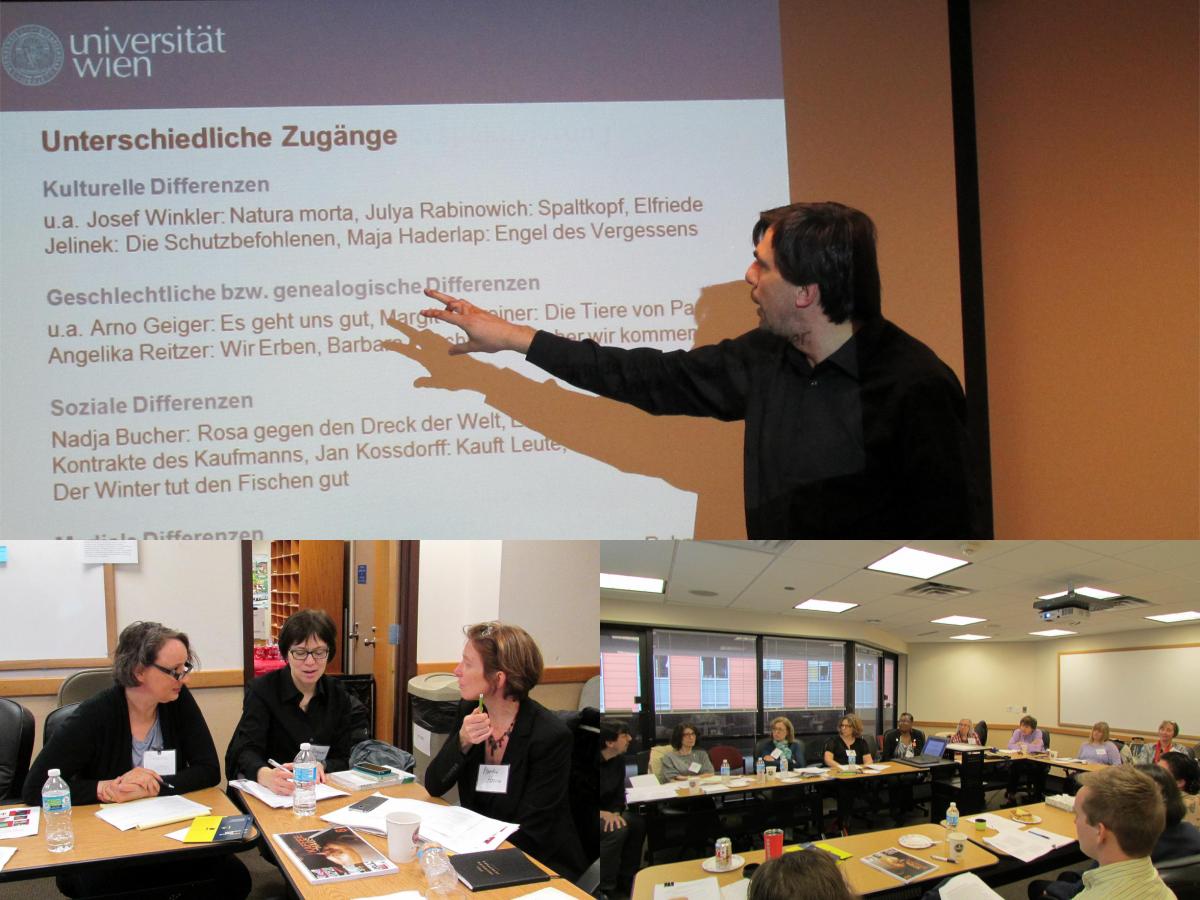
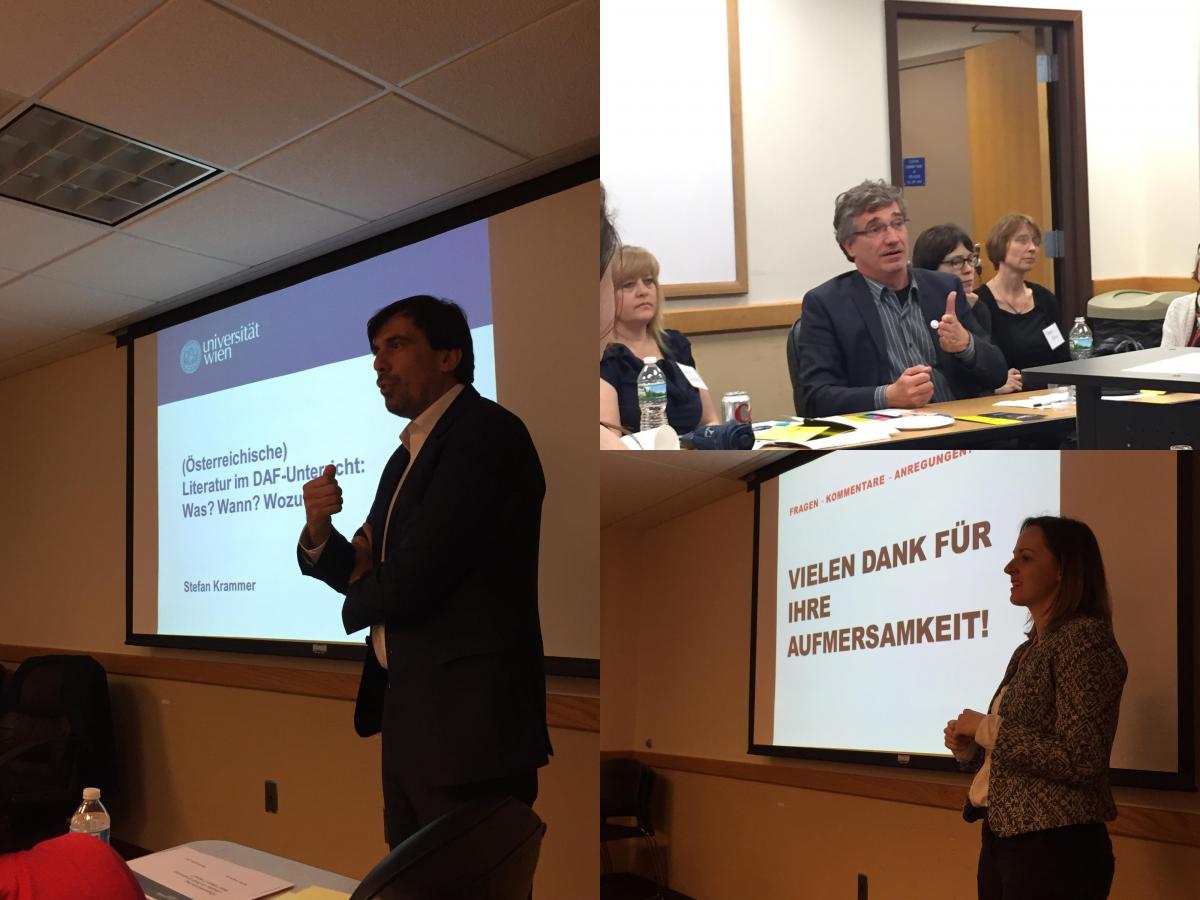
Speaker Series: Scholars in the DC Area featuring Dr. Jonathan Skolnik
March 17, 2017
Author and Associate Professor of German at UMass Amherst Dr. Jonathan Skolnik joined the German Department to talk about his book Jewish Pasts, German Fictions (Stanford, 2014). In his talk he examined popular Jewish-German authors, artists, and directors such as Franz Kafka and Edgar Ulmer and the effects they have had on Jewish-German culture. Particularly, he focused on the period of time leading up to the Holocaust and how Jews in Germany perceived themselves, their religion, and their nationality, as well as how they proceeded to assimilate to German culture and transform stories of their Jewish past into popular German fiction.
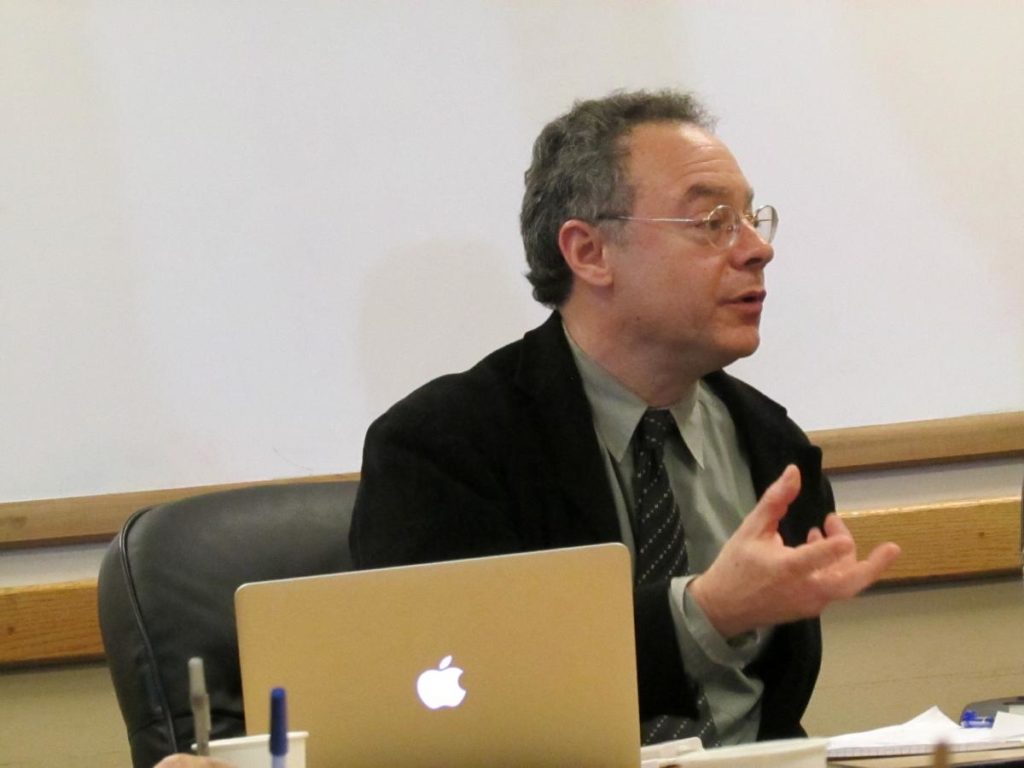
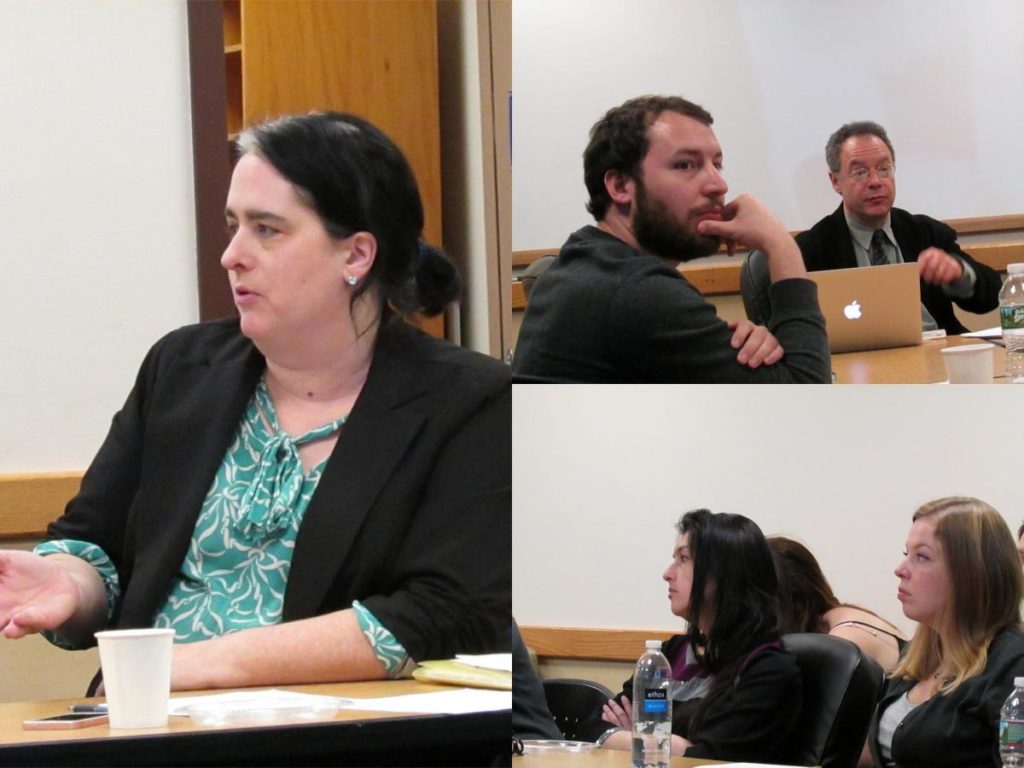
Developing Multiple Literacies – 20 Year Celebration
March 2, 2017
In 1997, the members of the Georgetown University German Department made a big decision to accept the challenge to reinvent the foreign language curriculum in a way that no other department had ever done and to do it whole sale. In a crucial February 7, 1997, meeting the faculty committed themselves to moving ahead and, in a daring moment of rational exuberance, to begin to develop and implement the new curriculum starting with the fall of 1997.
Now, 20 years later, we celebrated the anniversary of that decision and the successes it has had and the lasting ways it has influenced us, our department, the cohorts of students that have experienced it, and the field of second language studies. The “Multiple Literacies” curriculum has directly impacted curricular reform and renovation of foreign language curricula in numerous institutions around the country and around the world. Our PhD students, colleagues, and visiting scholars have incorporated aspects of our curricular thinking directly into their educational work at Emory University, Mt. Holyoke College, the University of Illinois (Urbana-Champaign), the University of Texas (Austin), the University of North Carolina (Greensboro), the Massachusetts Institute of Technology, the George Washington University, as well as to other institutions and organizations such as the Goethe Institute (USA) and the State Department’s Foreign Service Institute.
This celebration featured a panel discussion with Drs. Heidi Byrnes, Katie Sprang, Brooke Kreitinger, Joe Cunningham, and Peter Pfeiffer.

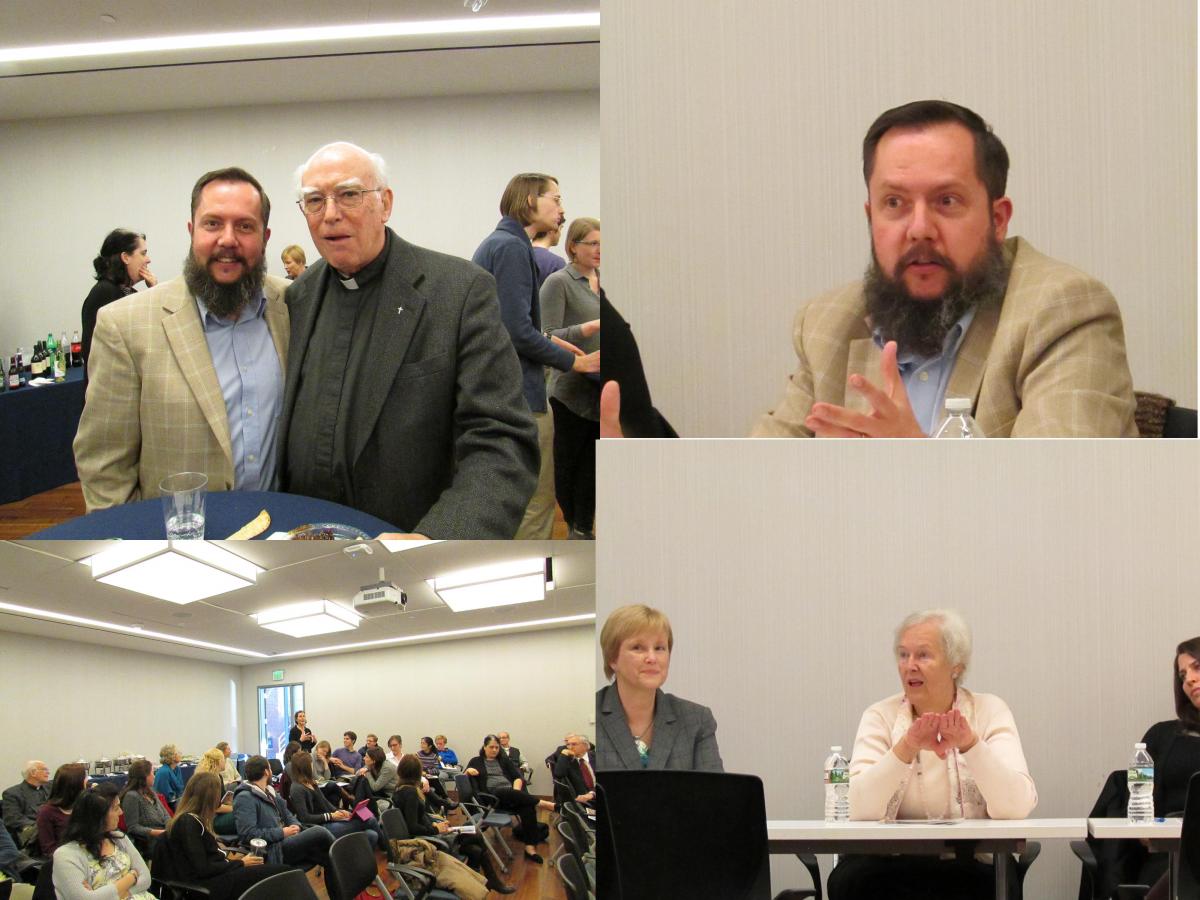
Reading and Discussion with Author Jonathan Huston
On February 7, 2017, the German department welcomed bilingual author Jonathan Huston to read excerpts from his works, most notably his collection of short stories titled Mondstaub – Erzählungen. This collection was published in Liechtenstein by Van Eck Publishing in March of 2016 and was also presented at the Leipzig Book Fair. The title story of the collection has been selected for the anthology Best European Fiction 2017, edited by Dalkey Archive Press. Following the reading and discussion, there was a small reception, with wine presented by the Embassy of Liechtenstein and from the winery of the Prince of Liechtenstein.
Jonathan Huston works as a writer and a translator in Liechtenstein and Los Angeles. As a former legal advisor to the Principality of Liechtenstein at the United Nations in New York, he worked, among other things, on the creation of the International Criminal Court and other international courts. He studied cognitive sciences, applied political science and law at Stanford University and New York University as well as promoted political philosophy at the University of Zurich. This event was co-sponsored by the Embassy of Liechtenstein.
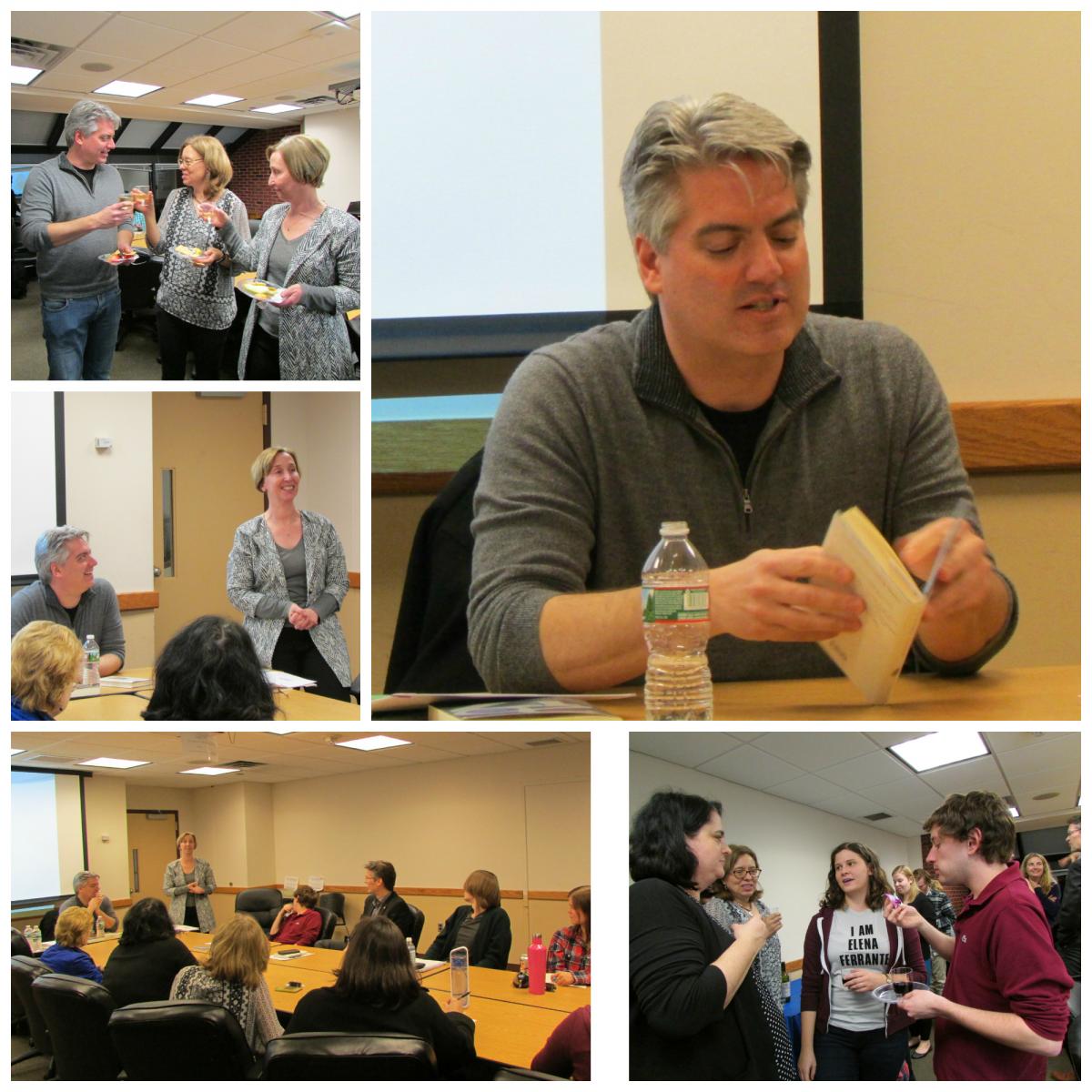
Roundtable: Graduate Program Alumni
November 4, 2016
The German Department hosted an Alumni Roundtable as part of ongoing efforts to foster opportunities for graduate students to connect with our alumni and learn more about potential career paths both inside and outside the academy. The roundtable featured three graduates of the department who pursued postgraduate paths in varying fields, who shared stories of their personal experiences using their doctoral training after graduation.
Roundtable participants included:
Margaret Gonglewski (PhD, 1996) is Associate Professor of German and International Affairs at George Washington University. She directs the German language program at GWU and teaches beginning through advanced language courses, including Business German.
Walter Rankin (PhD, 1998) is the Deputy Dean for the School of Continuing Studies (SCS) and Senior Advisor to the Provost for Accreditation & Special Projects; he has also served as interim dean for SCS. After earning his Ph.D, he served as the deputy associate dean in the College of Arts & Sciences at George Mason University for ten years before returning to Georgetown.
Anne Thiel (PhD, 2001) is Communications Manager at Forest Trends, where she supports their internal and external communications activities. She has also held positions at Sustainable Finance Ltd. and the World Resources Institute.
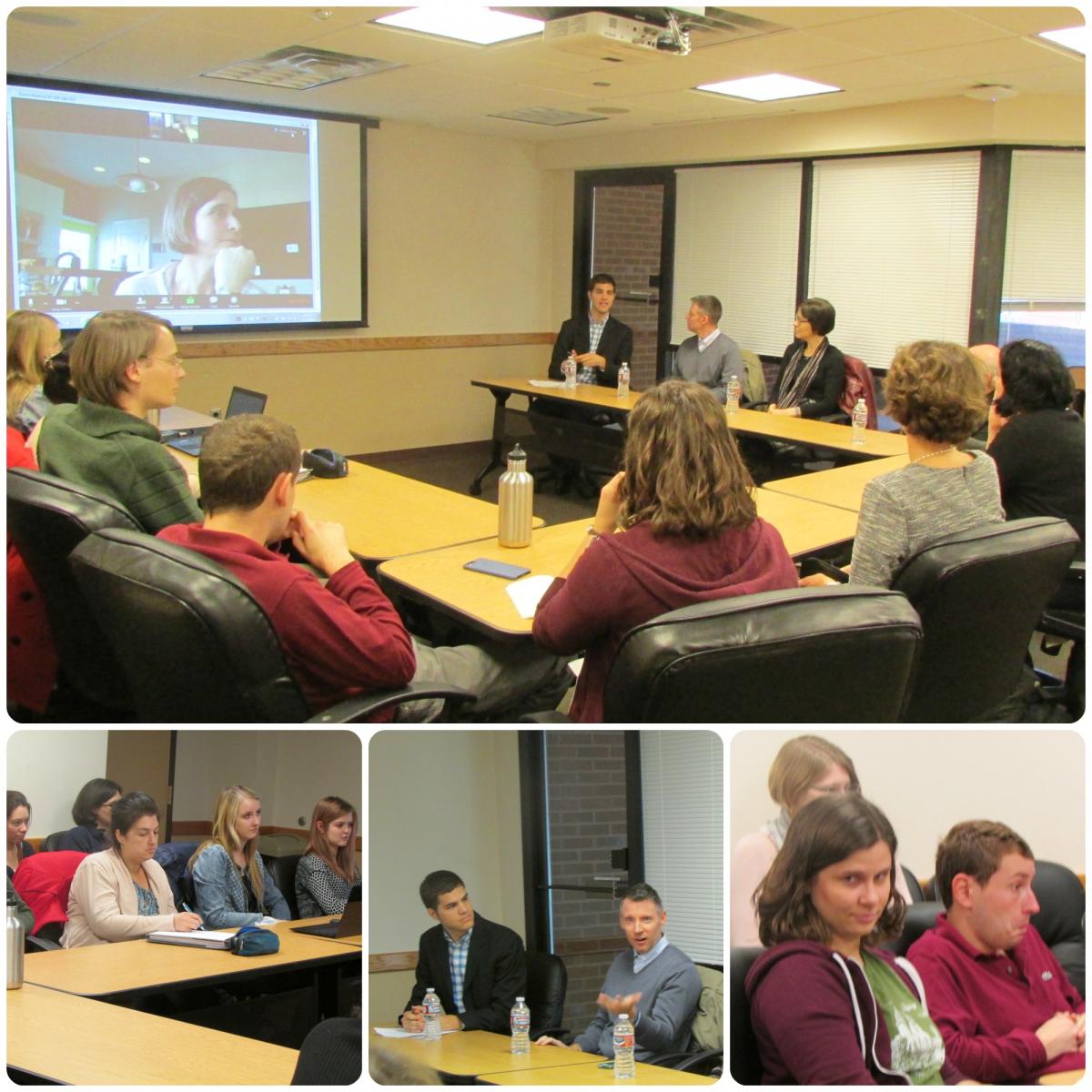
Speaker Series: German Scholars in the DC Area Featuring Dr. Julie Koser
October 20, 2016
We welcomed Dr. Julie Koser as the guest speaker in the German Department’s inaugural Speaker Series: Scholars in the DC Area. Dr. Koser presented on “Destabilizing Dominant Narratives: Benedikte Naubert and ‘Enlightenment Orientalism.'” Julie Koser is Associate Professor of Germanic Studies in the School of Languages, Literatures, and Cultures at the University of Maryland. She received her PhD in German with a Designated Emphasis in Women, Gender, and Sexuality from the University of California, Berkeley. Her research focuses on the literature and history of the Goethezeit and is informed by gender and feminist studies, cultural studies, and postcolonial studies. She has published articles and book chapters on French female revolutionaries in the German press, the dramatist Heinrich von Kleist, the self-proclaimed Swiss Amazon Regula Engel-Egli, and the prolific author Benedikte Naubert. Her monograph Armed Ambiguity: Women Warriors in German Literature and Culture in the Age of Goethe appeared in 2016 with Northwestern University Press. Her current book project, Renegotiating the German Orient around 1800, juxtaposes fictional and non-fictional constructions of the Orient in works by German-speaking women writers.
Lecture with Max Kade Visiting Professor Dr. Doris Bachmann-Medick
October 13, 2016
The German Department hosted a lecture with Max Kade visiting professor Dr. Doris Bachmann-Medick, titled “Fortschreiten, Schwanken, Abstürzen: Bewegungsformen in der Literatur.” Der Vortrag zeigt, wie sich Literatur und die gegenwärtige Raumdiskussion wechselseitig bereichern können. Gerade literarische Beispiele verdeutlichen die jüngste Dynamisierung eines spatial turn in den Humanities, wobei zunehmend Bewegung, Mobilität und Aktivitäten der Verortung eine Rolle spielen und wichtig werden. Dies soll an historischen Veränderungen der literarischen Raumwahrnehmung vom 18. Jahrhundert bis zur Gegenwart exemplarisch vor Augen geführt werden. Sind die Bewegungsformen des Fort-Schritts und der expansiven Raumaneignung seit dem 18. Jahrhundert heutzutage überhaupt noch als wesentliche Leitvorstellungen anzusehen? Kommen in der Literatur nicht immer stärker auch Gegenbewegungen der Irritation und der Verunsicherung ins Spiel?
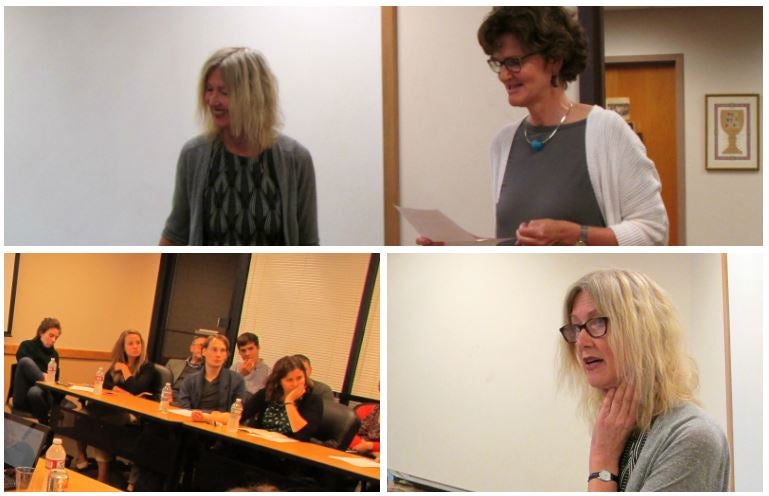
Lecture and Workshop with Professor Ritchie Robertson
September 15-16, 2016
The German department welcomed Professor Ritchie Robertson for two events, a lecture titled “Rethinking the Enlightenment: The Poetics of Sympathy from Lessing to Burns” and a workshop on three short works written by Franz Kafka.
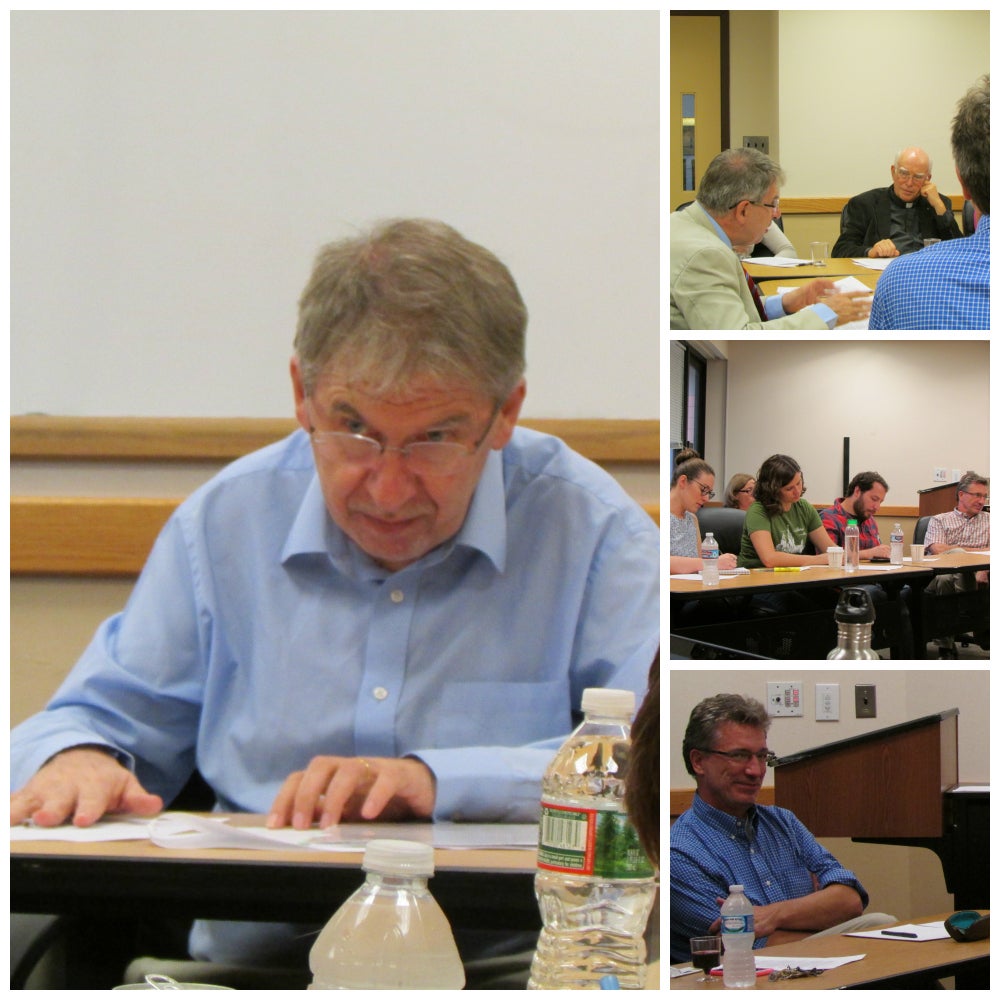
Ritchie Robertson is Professor of German Language and Literature, Fellow of the Queen’s College, Faculty of Modern Languages, University of Oxford, UK. He is the author and editor of numerous books on Franz Kafka, Heinrich Heine, the “Jewish Question” in German Literature, German Enlightenment, and many other topics. He is also the translator of Franz Kafka’s The Man who Disappeared (Amerika). He is co-director of the Oxford Kafka Research Centre and of the Besterman Centre for the Enlightenment. He is currently working on a book on the Enlightenment as an international movement.
Meanings of Modern Work in Times of Disruption, 19th and 21st Centuries
April 8-9, 2016
Georgetown German Professor Peter C. Pfeiffer, in cooperation with the BMW Center for German and European Studies and the Deutsche Akademische Austauschdienst (DAAD), hosted an international and interdisciplinary conference on April 8th and 9th exploring “Meanings of Modern Work in Times of Disruption in the 19th and 21st Centuries.” The conference brought together a wide array of scholars and professionals from American and European Universities to present their recent research and foster interdisciplinary dialog in the six panels moderated by Georgetown German Department professors and one of our department’s PhD candidates, Emily Sieg.
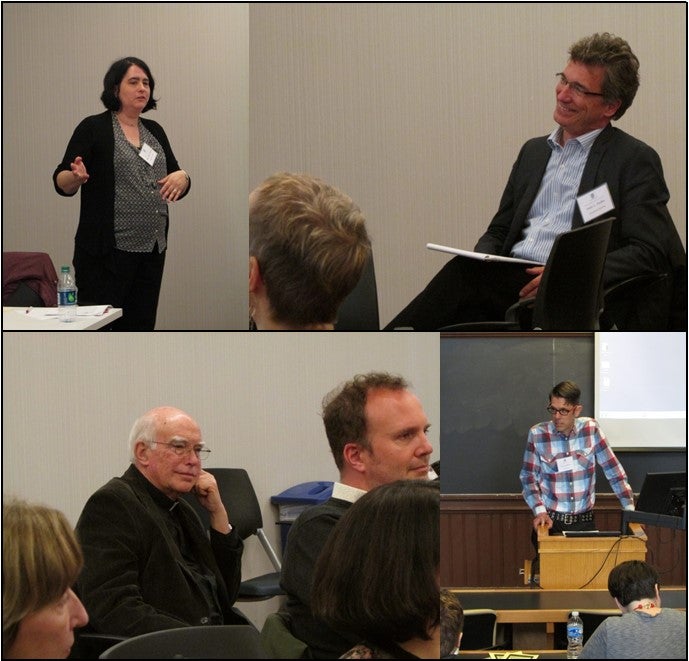
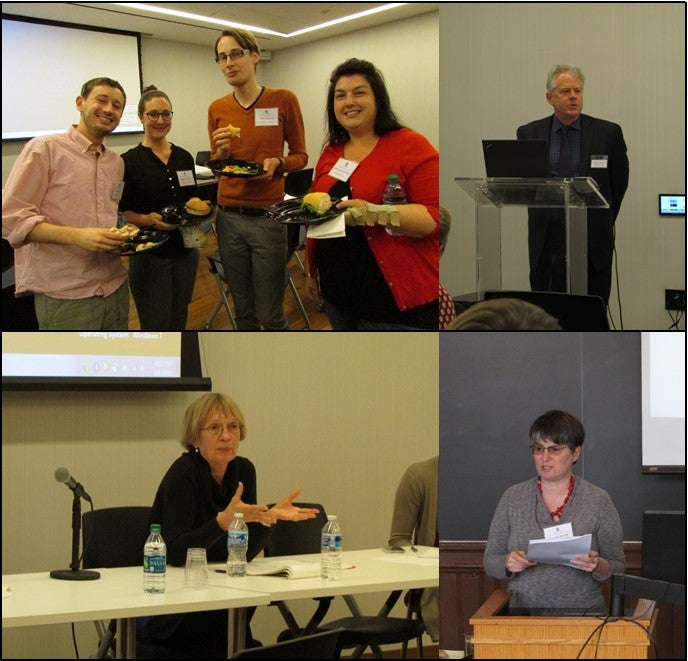
The participants began the conference with a panel exploring the historical approaches to work with featured speaker Professor of Sociology Richard Biernacki (University of California, San Diego) offering an intriguing contrast of the early modern German and English publishing systems’ respective views of the author as either a seller of Arbeitskräfte or a seller of products. The first day included an exploration of models of different ways to organize work in Goethe’s late novels and ended with two presentations examining work ethic and success in times of disruption both in contemporary German literature and the 19th century works of Swiss author Jeremias Gotthelf.
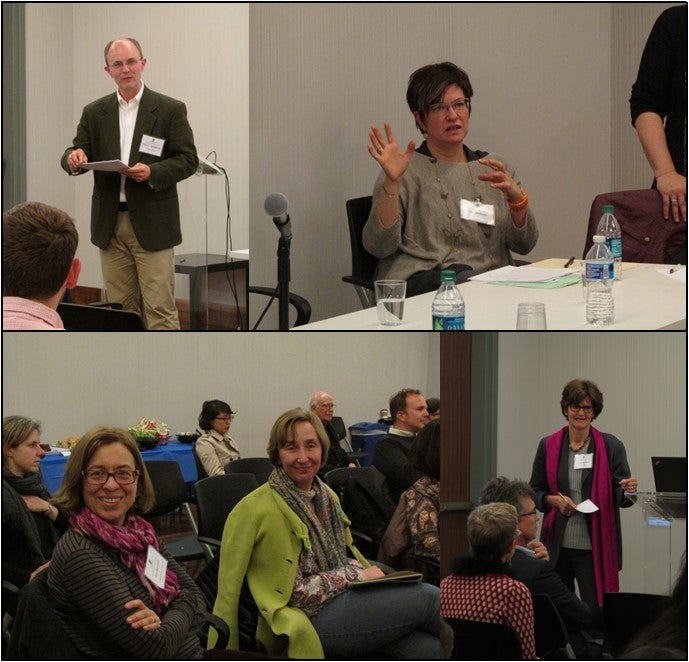
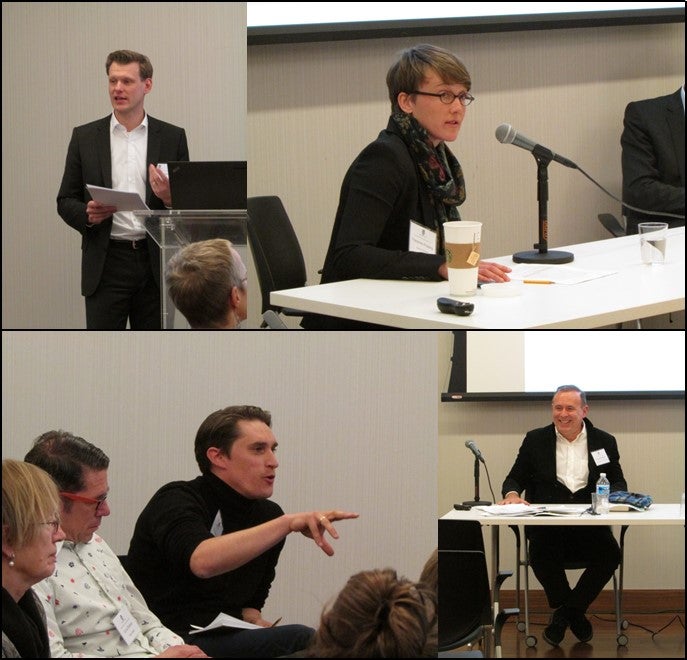
The second day saw another three fascinating panels covering the relations of labor, film, and philosophy to the meanings of work. Dr. Anna Echterhölter kicked off the first panel with a presentation of her research on the use of welfare and government programs in times of disruption and its current implementation through “Smartcards” in modern refugee camps. The film panel addressed different representations of work, especially female work. The final panel of the day and the conference dealt with philosophy and meanings of work exploring the role of leisure, technology, and even Nietzsche’s relation to the modern self-help book. Featured speaker Professor of Philosophy Michael Festl (University of St. Gallen) sparked intense discussion in his argument for a new normative conception of work and the role of workers. The guests ended the second day of the conference with the opportunity to continue their fruitful interdisciplinary discussions over hors d’oeuvres at a reception in the German Department. The reception and conference ended with heartfelt words by Dr. Sabine von Dirke (University of Pittsburgh) for all of the hard work put in by Professor Pfeiffer, Courtney Feldman, and the entire German Department that made the conference such a great success.
-Nathan Tschepik
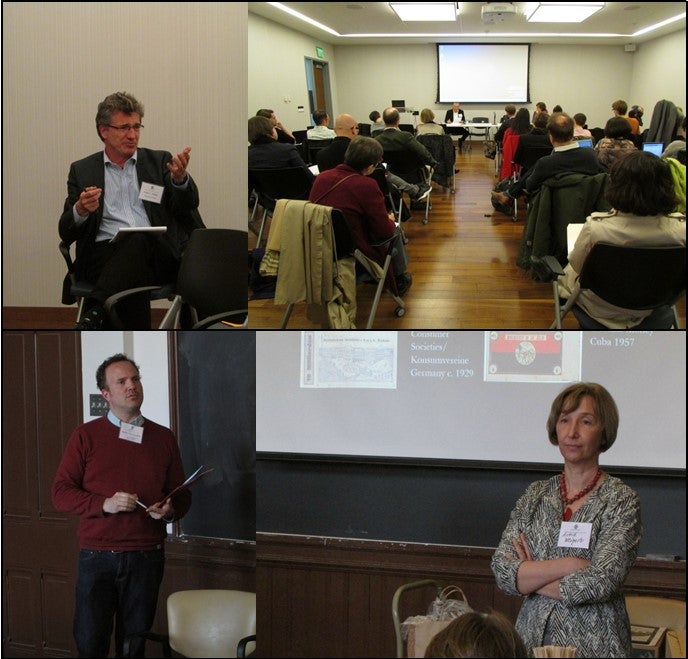
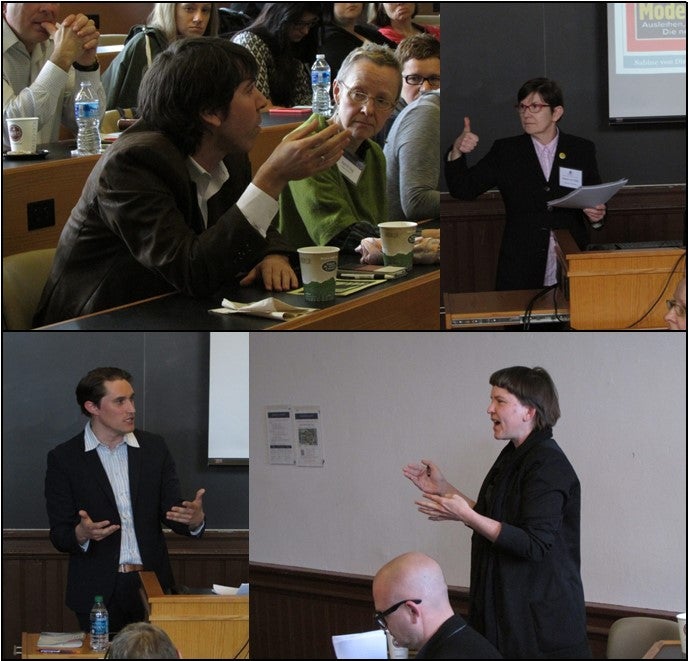
Discussion with Max Kade Writer-in-Residence Maxi Obexer
March 18, 2016
The German Department hosted a reading with Maxi Obexer of her new essay, “Der längste Sommer.”
Es ist keine sonderlich lange Reise, die die Protagonistin unternimmt, um von Norditalien nach Berlin zu reisen, wo sie in einer offiziellen Zeremonie an ihrer deutschen Einbürgerung teilnehmen wird. Allerdings führt die Reise über zwei Grenzen, die italienisch-österreichische und die österreichisch-deutsche. Während sie im Zug über ihre eigene Einwanderung nachdenkt, steigen sechs junge Männer ein. Es sind Geflüchtete, die versuchen, es bis nach Deutschland zu schaffen. Die Beobachtung der inzwischen tief schlafenden Jungs in ihren Sitzbänken lässt sie weiter nachdenken. Sie fragt sich, wie sie in zwanzig Jahren darüber berichten werden. Werden ihre Erfahrungen des Einwanderns gewürdigt werden? Was bedeutet Migrieren?
Dass sie als EU-Bürgerin Privilegien genießt, die anderen Einwanderern vorenthalten werden, ist Teil ihres Versuchs, innerhalb der Distinktionen und Begrifflichkeiten ihre Position zu finden und auch zu fragen, wem denn die scharfe Distinktionspolitik nützt. Wer zahlt den Preis zahlt für die Privilegien weniger. Der Essayband und “Einreisebericht” ist Teil eines Versuchs herauszufinden, wo Europa sich heute befindet, welchen Weg es noch zu gehen hat, und an welche Visionen zu erinnern ist, bzw. an welche uns gerade die Geflüchteten erinnern.
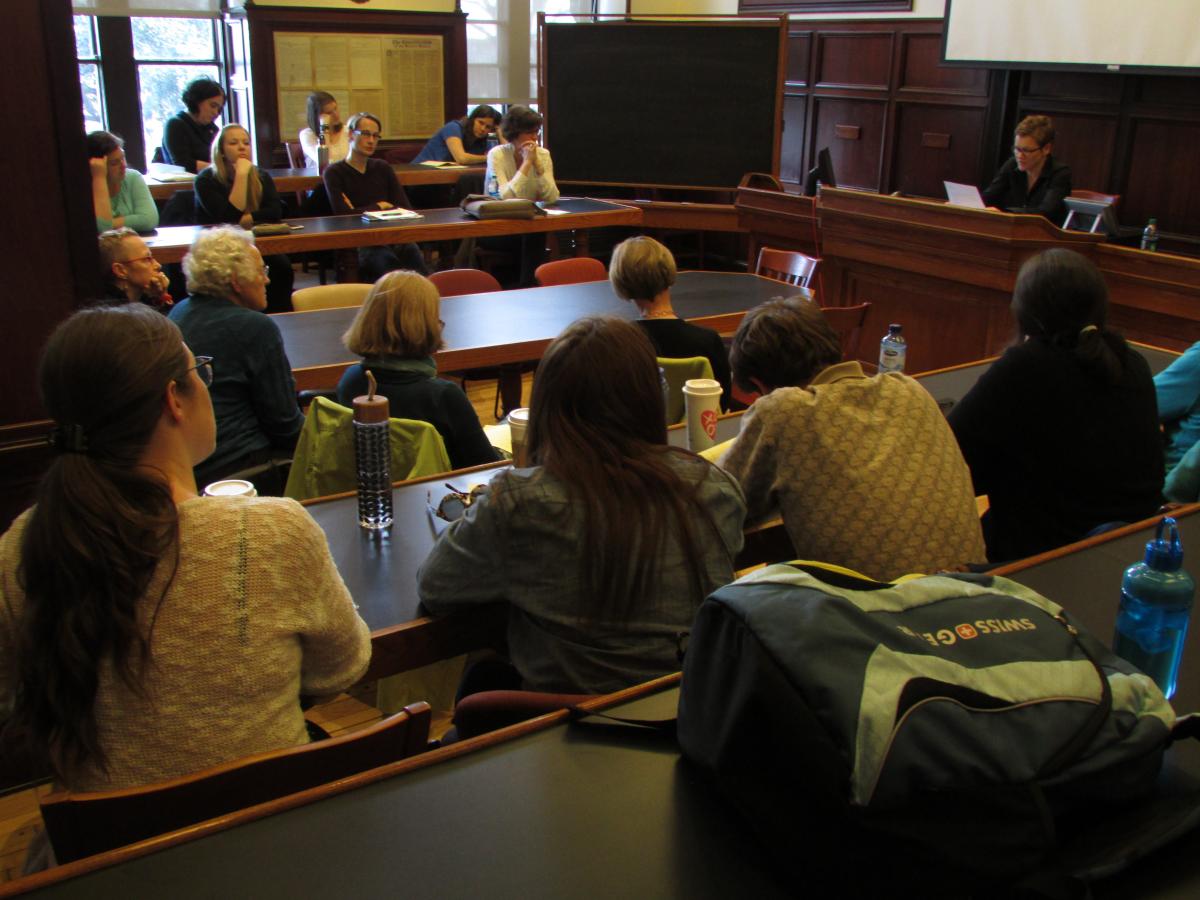
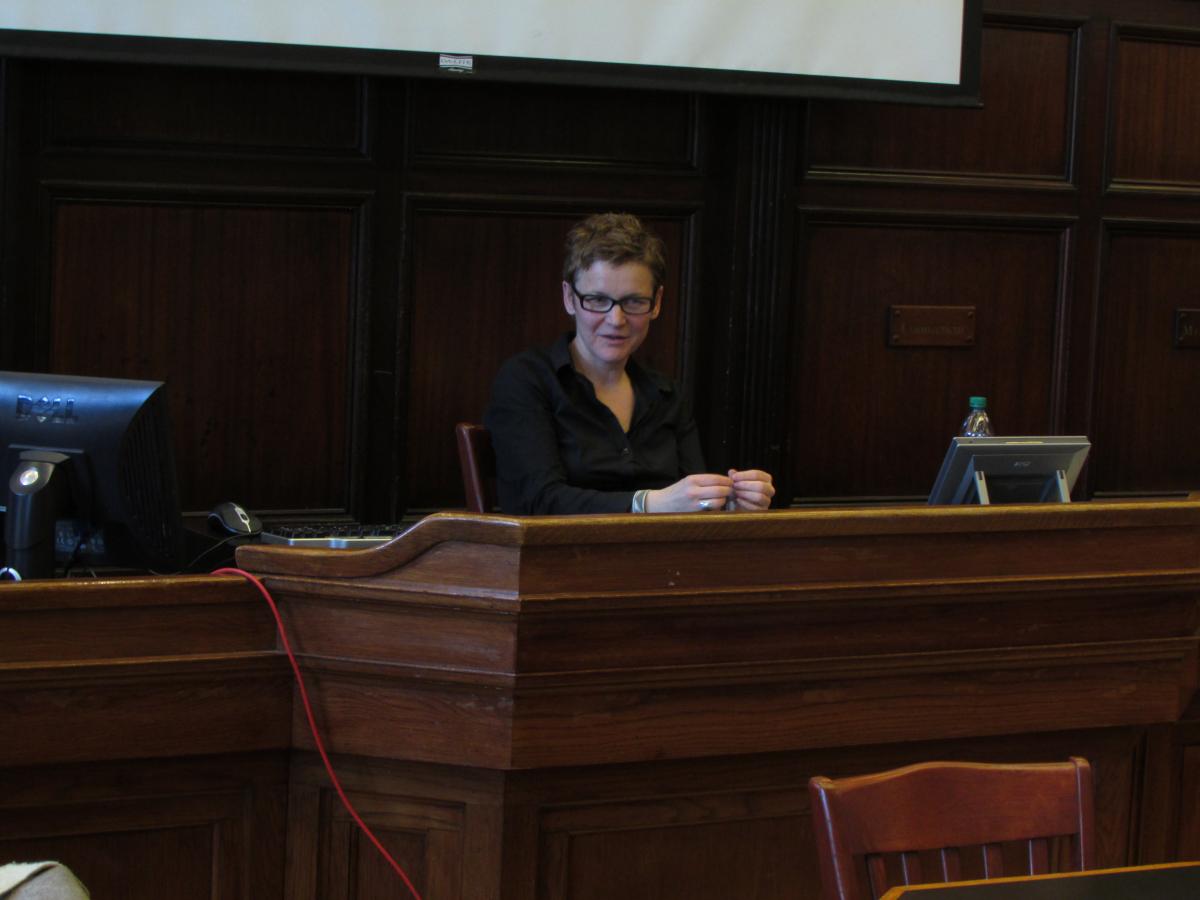
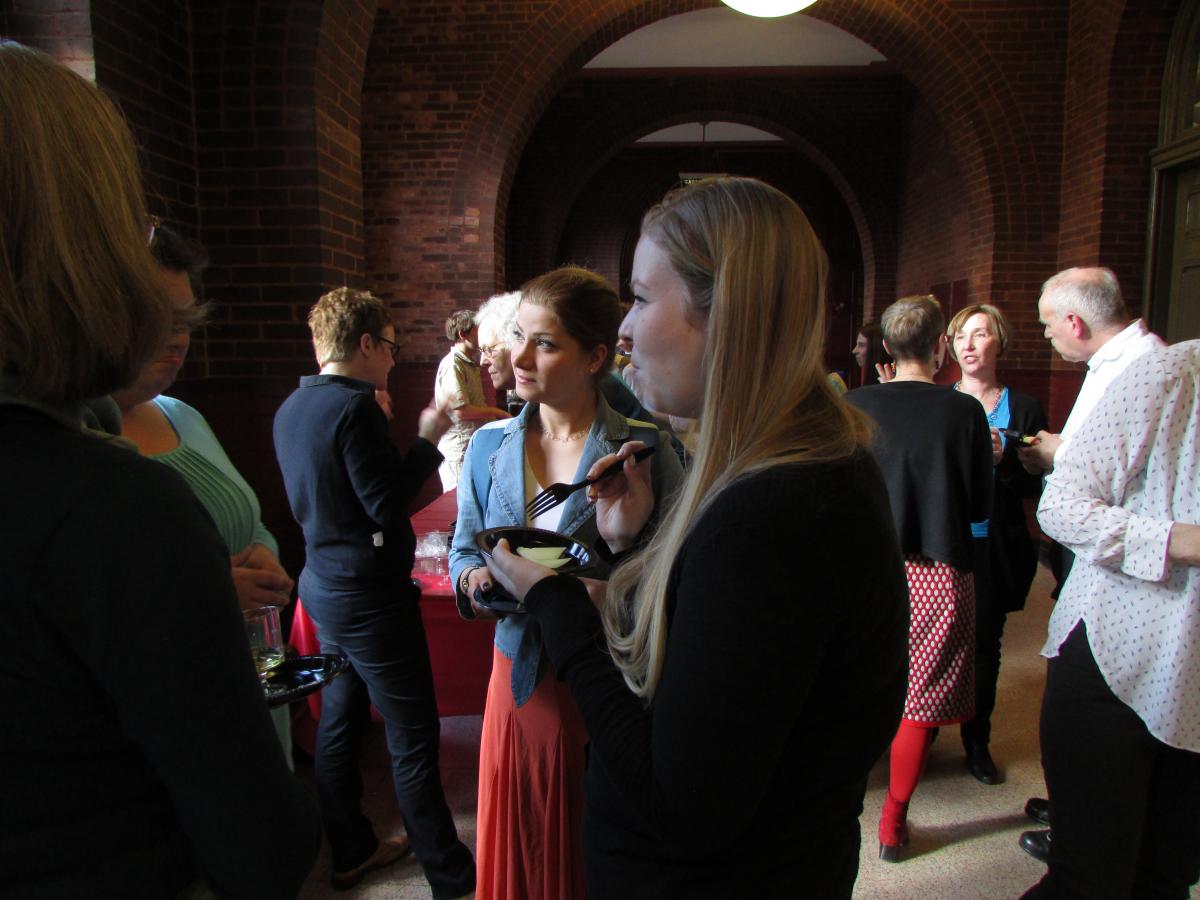
Lecture with Prof. Michael Braun, Memory Contests: Neue deutsche Erinnerungskulturen im Film
February 26, 2016
Since unification in 1990, the number of films dealing with Germany’s various pasts has surged. The problem they confront us with, however, is no longer how to come to terms with the past (“Aufarbeitung der Vergangenheit,” Adorno), but how to convey the cultural challenges of an ambivalent heritage. German Memory Contests (Anne Fuchs) confronts the realms of private vs. the public, family vs. generation, victims vs. perpetrators, and fact vs. fictions, opening up a dialogue which aims to transform “bad history” into a positive account of the past in terms of film narration. This lecture presented films significant for confronting a different kind of iconoclastic, pluralistic, and fictionalized memory. What happens if filmmakers insert new narratives to well-known histories (like Bryan Singer in Valkyrie – Operation Walküre with Tom Cruise as Stauffenberg)? Or if they even change the past in alternative narratives of resistance and counter-terror (like Tarantino)? And how do these films change our image of the German past?
Professor Michael Braun is the director of the literature department at the Konrad Adenauer Foundation, and the author of numerous publications dealing with memory and German culture, including the 2010 “Wem gehört die Geschichte? Erinnerungskulture in Literatur und Film.”
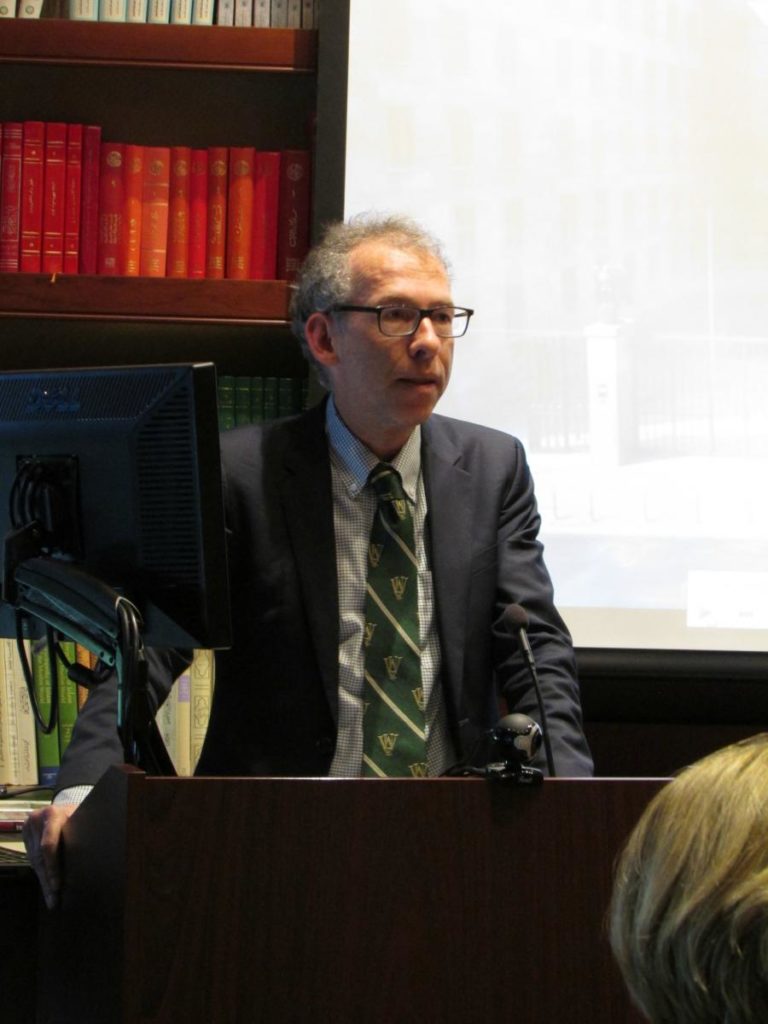
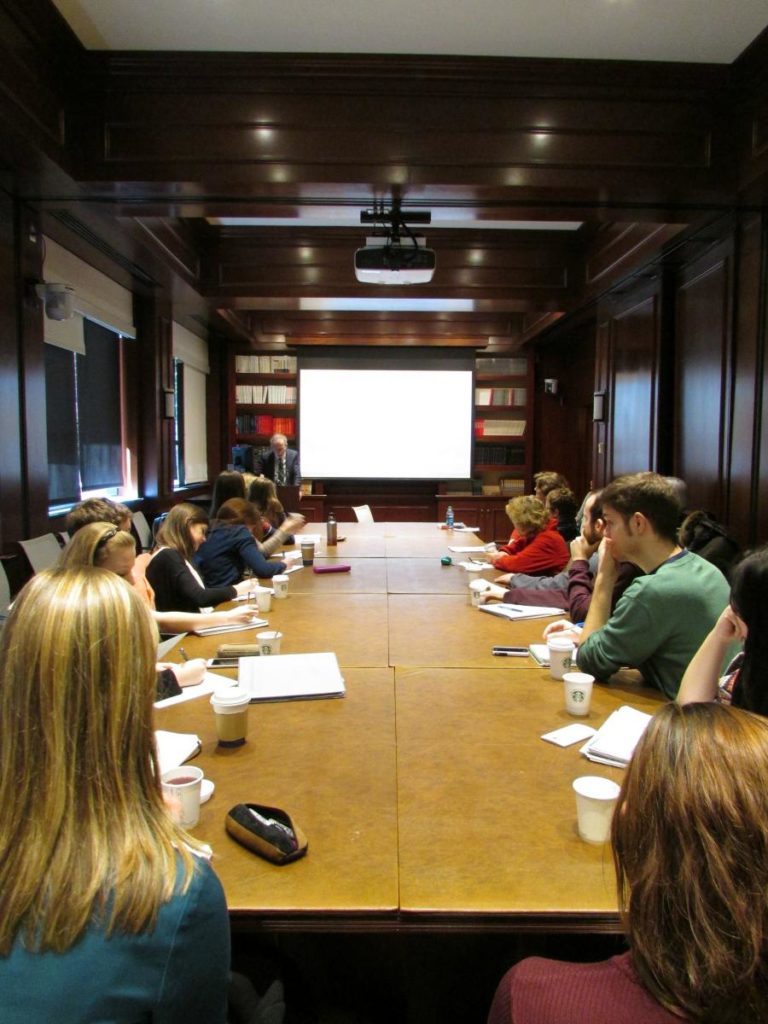
Advanced German Speech Competition
February 24, 2016
In Advanced II, students are exposed to authentic speeches given by German politicians and intellectuals that both inform them about the historical events that led to the fall of the wall as well as problematize the social, economic, and political conditions that followed the German reunification.
After engaging with these materials for several weeks, students wrote their their own speeches commemorating the 27th anniversary of the fall of the Berlin wall. In their speeches, the students took a stance as young and informed Americans able to connect the events of November 9, 1989, and its consequences to contemporary social, political, and economic situations across the globe. The main question they pondered was: “27 years later: Walls back then – walls now. A reason to celebrate?“
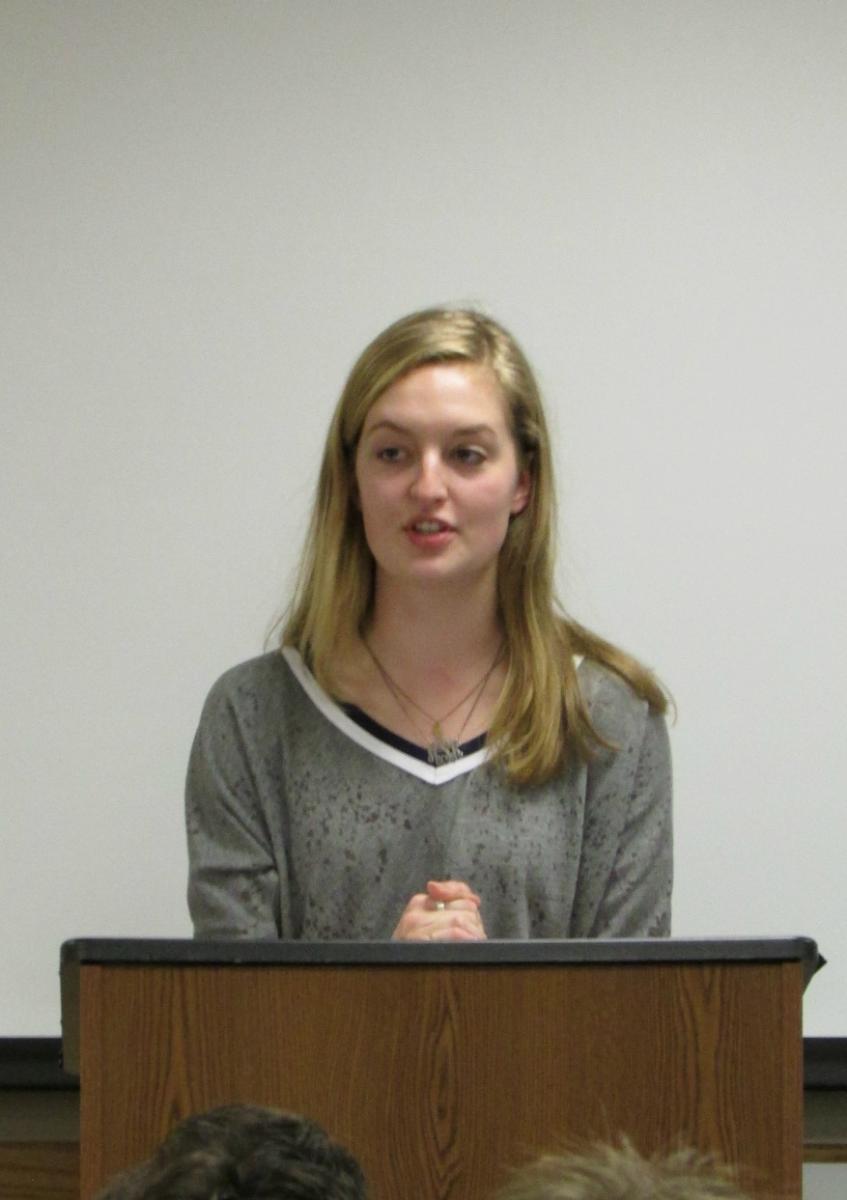
Discussions with Max Kade Writer-in-Residence Maxi Obexer
January 27 and February 17, 2016
Since becoming a fellow of the Literarisches Colloquium Berlin (LCB) at the age of 23, Maxi Obexer has been living in Berlin. In addition to her creative work, she regularly writes reviews and essays for newspapers and anthologies. In 2014, she founded the Neue Institut für Dramatisches Schreiben. Obexer is known for her political plays, audio plays, and essays. She introduced her dramatic work at these discussions and talked in-depth about her recent project titled “Illegale Helfer,” which addresses the situation of people who provide “illegal help” to refugees in Germany and Europe. “Illegale Helfer” was recently performed as a radio play, the audio link is available below.
Sie kommen aus der Mitte der Gesellschaft – Ärzte, Richter, Sozialarbeiter, Studenten. Aber was sie tun, bringt sie an den Rand der Illegalität. Und manchmal darüber hinaus. Nur weil sie eines tun: helfen Flüchtlingen und Migranten ohne legalen Status. Sie retten sie vor der Abschiebung, bieten ihnen Schutz und Unterkunft, oder bringen sie über die Grenze, wenn alle anderen Wege ausgeschöpft sind. Einige von ihnen sind dadurch schon mehrfach straffällig geworden; andere riskieren ihren Beruf und sozialen Status.
Das Theaterstück und Hörspiel rückt die Bedeutung der Zivilgesellschaft ins Zentrum. Im Konfliktfeld zwischen nationaler Gesetzgebung und den Menschenrechten, aber auch zwischen Ohnmacht und Verantwortung.
Hörspielproduktion WDR Frühjahr 2015.
Gefördert von der Filmstiftung Nordrhein-Westfalen
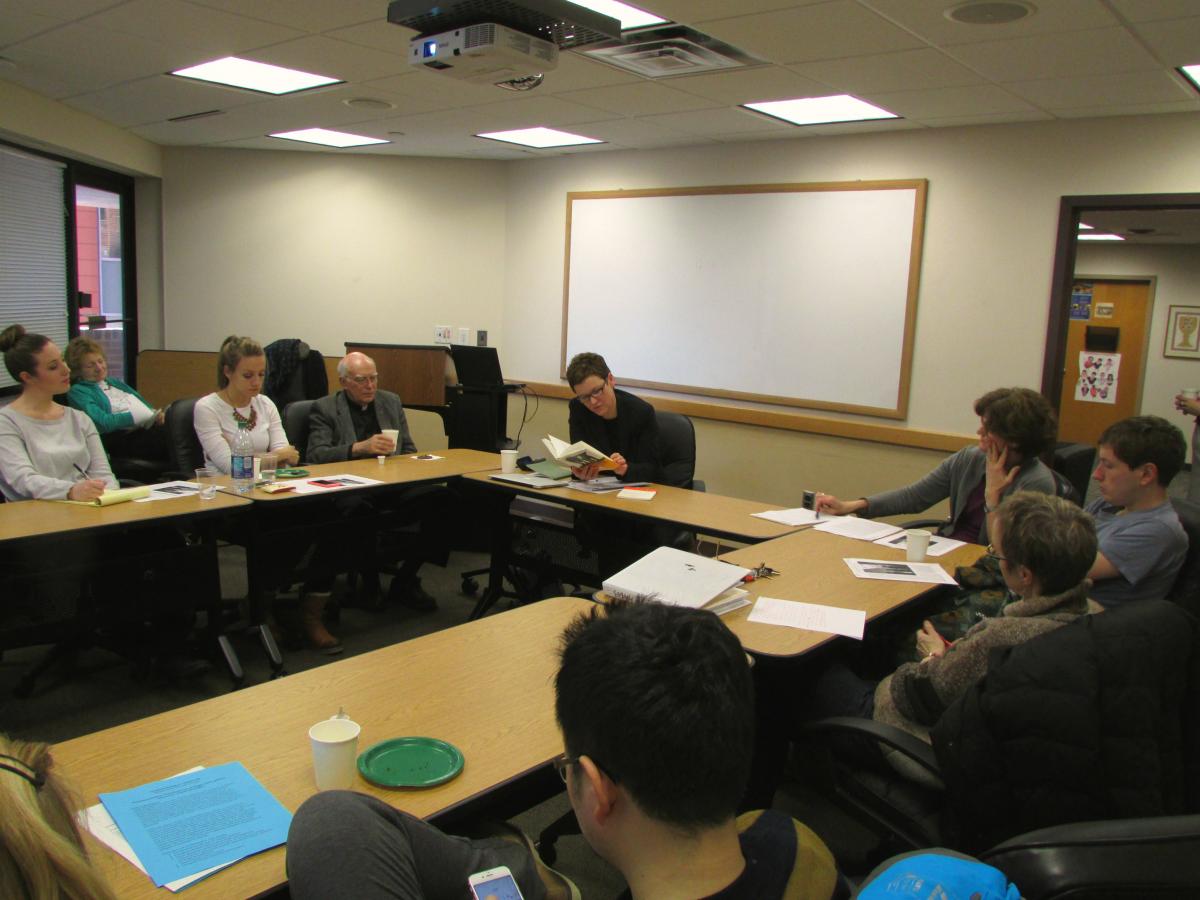
Michael Götting Reading from his Novel Contrapunctus
October 26, 2015
Michael Götting’s recent novel Contrapunctus (2015) is set in Berlin in 2002 and depicts the lives of four Afro-German protagonists in the early years of the Berlin Republic. It shows the effects of resurging nationalism and racism on their relationships, their struggle to maintain their bonds, and a pervasive sense of disconnectedness. It is “a polyphonic, wild journey through the life of its Afro-German protagonists and the collective consciousness of the Berlin Republic.”
Michael Götting is an author, journalist and curator. He writes for ZEIT ONLINE, Deutschlandfunk and the Tagesspiegel. At the Theater Ballhaus Naunynstraße in Berlin he curated an events series around the anniversary of the so-called Congo Conference of 1884, as well as the symposium Decolonize Bodies! Minds! Perceptions! As a docent, he teaches writing workshops for Schools without Racism – Schools with Courage, the Friedrich-Elbert Foundation, and the archive of Youth Cultures.
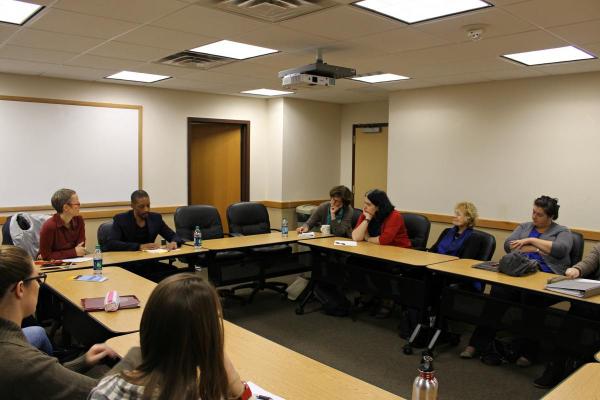
Hanns Eisler on Brecht, Music, and Culture
September 30, 2015
German Department Professor Katrin Sieg and the Georgetown University German Department presented Hanns Eisler on Brecht, Music and Culture, a dramatic performance by Sabine Berendse and Paul Clements. This book, about the friendship and collaboration between the playwright Bertolt Brecht and the composer Hanns Eisler, has been a sensation in Germany since the 1970s. At long last it has now been translated into English. In addition to the book, the translators created a dramatic reading and multimedia performance to make the audience experience first-hand what Eisler has to say about his friend Brecht. The committedly left-wing Eisler reflects on their exile from Nazi Germany in Los Angeles and recalls their bruising encounters with the House Committee on un-American Activities. Humorously and lively he talks about philosophical themes concerning the future of the arts, artists and the lives of ordinary people.
What would a show about a composer be without his music? The performance includes recordings of Eisler’s music in different genres as well as recordings of Eisler himself singing and playing the piano. Rarely seen photographic images of Eisler and others illustrate the show.
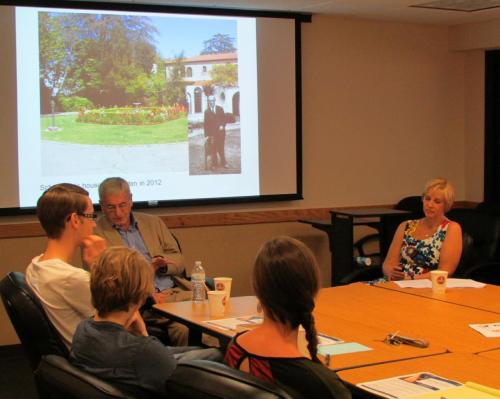
Auditory Knowledge in the Arts Conference
September 24-26, 2015
German Department Professor Mary Helen Dupree and the Georgetown German department hosted an interdisciplinary workshop on “Auditory Knowledge in the Arts” on September 24-26, 2015. The workshop explored how artistic practices from the eighteenth century to the early twentieth century were informed by knowledge about the auditory dimension, and to what extent these artistic practices generated new knowledge or modified existing knowledge. It brought together scholars working in the fields of literary studies, cultural studies, musicology and ethnomusicology, sound studies, and the history of science.
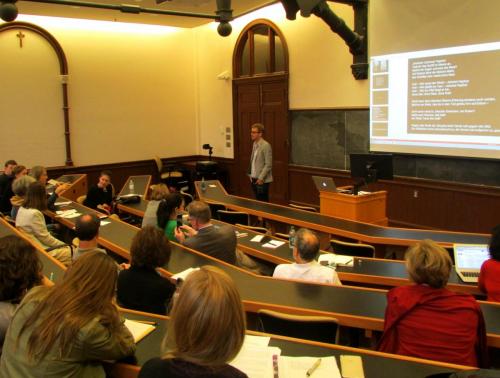
The workshop represented a unique interdisciplinary collaboration with the Berlin-based international research network “Auditory Knowledge in Transition” (Hör-Wissen im Wandel), sponsored by the German Research Council. The conference opened on Thursday, September 24 with a keynote talk by Professor Thomas Levin (Princeton) on “Dramatic Recordings: Personal Gramophonic Inscription as Narrative Device in Fiction Film.” Panel speakers included Patrick Feaster (Indiana University), Joy Calico (Vanderbilt), and Benjamin J. Harbert (GU). The complete program can be found in Box.
Workshop on Selecting and Sequencing Texts for Content- and Language-based Curriculum
September 18, 2015
German Department Professor Marianna Pankova hosted a workshop on selecting and sequencing texts for foreign language (FL) curriculum. The Georgetown University German Department (GUGD) undergraduate curriculum is one of the few programs that conceptualized and implemented an approach based on reform in FL education–grounded in the exploration of content, cultural practices, and multicultural perspectives, the literacy-oriented GUGD´s curriculum is organized around texts that function as curricular-building blocks for fostering language and content learning. The workshop addressed questions such as, “What defining criteria would one use when selecting and categorizing the texts? And how can these texts be sequenced on a continuum from simpler to more complex in order to foster literacy development as expansion of one’s ability to make meaning in a FL?”
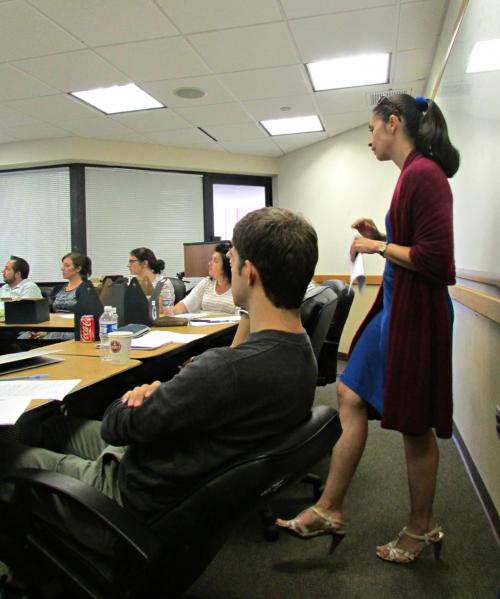
Drawing on Systemic Functional Linguistics (Halliday & Matthiessen, 2004) and genre theory (Coffin, 2006; Martin, 2009), this workshop laid out key theoretical principles for text categorization and sequencing. Going beyond the consideration of complexity of language forms, the suggested framework approaches progression in texts from three interrelated perspectives: the situational and cultural context of textual production, the discourse-semantic realization of contextual goals, and the lexicogrammatical construal of these contextually-bound meanings. Workshop participants were able to improve their understanding of the curricular principles that underlie the program as they applied them to the analysis of three increasingly complex texts.
German Honors Theses Presentation
April 16, 2015
Two undergraduate German majors presented their Honors Theses to a gathering of German Department faculty and students. Catherine Sandstrom, a German and Government double major, examined the position of immigrants in German society using Rainer Werner Fassbinder’s Ali: Angst Essen Seele auf and Yasemin Samdereli’s Almanya: Wilkommen in Deutschland, using the ability to communicate as a reference point for cultural change. These two films confined the discussion historically: Fassbinder filming Ali in 1973, the same year as Germany’s Anwerbestopp, and Samdereli creating Almanya in 2010, coinciding with the 50th anniversary of Germany’s guest worker program. By exploring daily actions, the author was able to highlight the artists’ opinions on the role of immigrants in German society and the exposure of German behavior opposite immigrants at the time of the film.
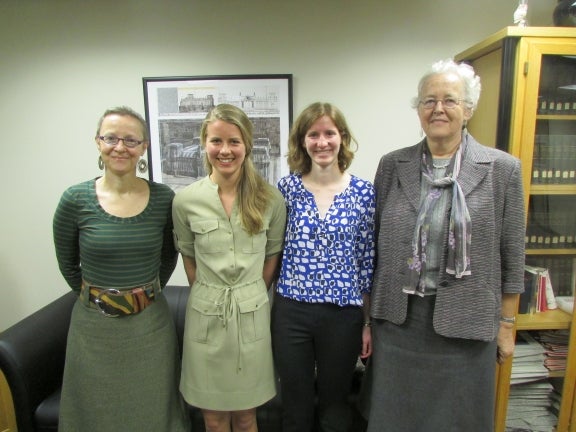
As a German and Economics double major, Aletha Smith focused on the influence of English on the German language as one of the most obvious phenomena of post-World-War-II German society. In her thesis, she evaluated and compared the underlying social arguments and linguistic assumptions in this debate from different perspectives, with a focus on the Verein Deutsche Sprache and similar groups, as contrasted with academic linguistic researchers. Her findings were as followed: While the groups attack each other using narrow linguistic arguments about words, language, and language change in regards to the merits or perceived dangers of the use of Anglicisms, the underlying critique from the VDS appropriates the phenomenon as a particularly plausible and convenient site for a wider sociopolitical critique against the considerable Anglo-American cultural influence in postwar Germany.
“Looking at the Overlooked: Stage Properties and the Table in Karl Lessing’s ‘Die Mätresse'” and a Workshop entitled “Looking at the Overlooked” in Eighteenth-Century Portraiture
April 10, 2015
Dr. Wendy Sutherland, Associate Professor of German Language & Literature at the New College of Florida presented a talk entitled “Looking at the Overlooked: Stage Properties and the Table in Karl Lessing’s ‘Die Mätresse’.” The talk analyzed the role of the black female in Lessing’s bourgeois drama and the depiction and meaning of colonial goods such as coffee, chocolate, sugar, tobacco and tea on the eighteenth-century Prussian aristocratic table.
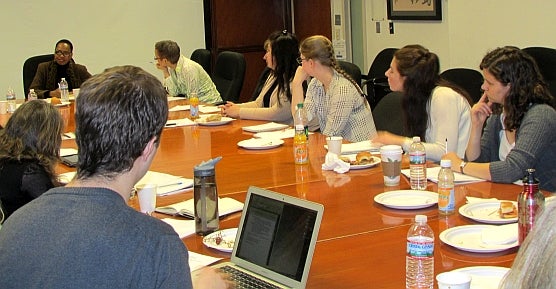
Dr. Sutherland’s subsequent workshop entitled “Looking at the Overlooked” in Eighteenth-Century Portraiture focused on four or five still life paintings from the book Looking at the Overlooked by Norman Bryson that she analyzed in her own work. This workshop extended the analysis of the repression of slavery by looking at how black servants and colonial goods are depicted in eighteenth-century portrait painting.
Graduate Student Conference: Conceptualizing, Investigating, and Practicing Multilingualism and Multiculturalism
February 27-28, 2015
The graduate students of Georgetown University’s Department of German, in conjunction with the graduate students from the Department of Linguistics, Department of Spanish and Portuguese, and the Department of Arabic and Islamic Studies, held a two-day graduate student conference titled “Conceptualizing, Investigating, and Practicing Multilingualism and Multiculturalism.” During this event, 32 graduate students from various countries and discipline areas presented their work. Alongside the presentations were workshops and roundtables (led by Georgetown faculty and Alumni) allowing students to further reflect on the conference themes of multi/translingualism and multi/transculturalism. Some highlights include the keynote addresses by Prof. Anna De Fina and Prof. Heidi Byrnes on Friday and Saturday evenings. Throughout the course of the two days, over 55 guests were in attendance, making this graduate student conference a resounding success. The graduate student planning committee would like to thank the Department of German, the Initiative for Multilingual Studies, the Georgetown University Graduate School of Arts & Sciences, and the Faculty of Languages and Linguistics for their financial contribution and support.
Politische Autorschaft und Religion in der deutschen Nachkriegsliteratur
February, 2015
A lecture with Dr. Christian Sieg was held in Spring 2015, during Dr. Sieg’s time as Max Kade Professor in the German Department. Das politische Engagement von deutschen Autorinnen und Autoren zwischen 1945 und 1990 hat mitunter dazu geführt, ihre Literatur als „erzählte Zeitgeschichte“ zu begreifen. Im Fokus vieler literaturwissenschaftlicher Darstellungen steht der Beitrag der ‚engagierten Literatur‘ zum politischen Diskurs. Wenig Beachtung haben hingegen die in den literarischen Texten verwendeten Motive, Narrative und Diskurse gefunden, die dem Schreiben politische Signifikanz zusprechen und es somit legitimieren. Autoren wie Bernward Vesper und Günter Grass oder Autorinnen wie Karin Struck und Christa Wolf inszenieren Autorschaft als politische Einspruchsinstanz gegen gesamtgesellschaftliche Fehlentwicklungen. Dabei greifen sie in ihren Texten auf gesellschaftlich anerkannte Kulturmuster zurück. Im Mittelpunkt des Vortrags steht die Frage, welche Rolle die Religion für die Inszenierung politischer Autorschaft in den 1970er und 80er-Jahren einnimmt.
25th Anniversary of the Fall of the Berlin Wall Speech Competition
November, 2014
This November the German Department celebrated the 25th anniversary of the Fall of the Berlin Wall with a series of events coordinated by Prof. Astrid Weigert and colleagues from George Washington University. One of the highlights was the speech competition. This event featured students from the Department’s Intensive Advanced German class.
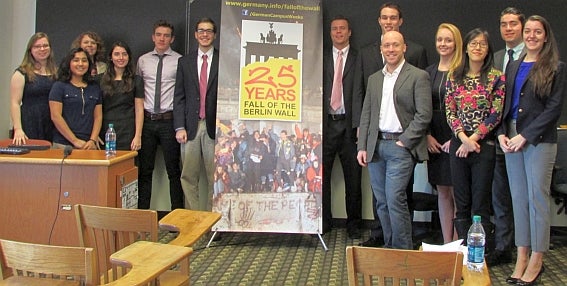
They were asked to write speeches, in which they addressed the question: 25 Jahre Mauerfall; ein Grund zu feiern? The students presented their speech in front of a jury, who assessed them for content, presentation and language features. While all of the students did a wonderful job and worked hard on their speeches, there could only be three winners. They are as follows:
1. Alexis Garau, COL ’15
2. Felix van der Vaart, SFS ’16
3. Gilda Gallardo, COL ’17
Congratulations Alexis, Felix and Gilda and to all the students for a job very well done. Please watch the individual speeches on YouTube.
Reflections of a Political Man: The Great War as Turning Point in the Work of Thomas Mann
November 20, 2014
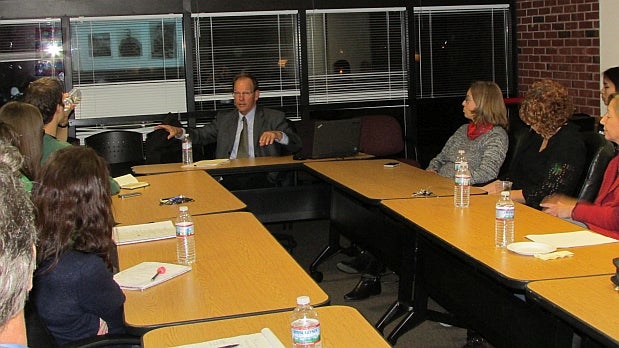
Todd Kontje (Princeton University) discussed Thomas Mann’s wartime journalism in the light of recent debates about the origins and consequences of the First World War. He argues that beneath Mann’s transformation from a bellicose German nationalist in 1914 to a supporter of Weimar democracy and opponent of National Socialism lies a consistent opposition to totalitarian ideologies and governments – if also an equally consistent but more disturbing use of racially-charged imagery and antisemitic stereotypes. At his best, Mann offers us a way to rethink the legacy of empire and to question those who would use recent efforts to absolve Germany of its war guilt as an excuse for a more robust nationalism today.
Pictures from a Non-Existing Country: The Autumn Before the Berlin Wall Collapsed
November 3, 2014
Andreas Voigt and his film crew took their camera and filmed people at the mass demonstrations in Leipzig in October 1989. In his presentation, he spoke about what happened during those tumultuous times and in the months that followed. A successful documentary filmmaker working all over Europe today, he looked back at the final year of divided Germany.
Imperial Germany’s Peculiar War, 1914-1918
October 23, 2014
Professor Roger Chickering’s lecture extended the discussion of modern Germany’s “peculiar path” (Sonderweg) into the era of the First World War, posing the question whether Germany’s experience was different in basic respects from France’s or Britain’s. The lecture explored especially the military impact and the longer-term developmental consequences of any such differences.
A Reading and Discussion on “Forced Migration and Postmemory” with German Author Ulrike Draesner
October 20, 2014
Ulrike Draesner’s recent novel Sieben Sprünge vom Rand der Welt (2014, Seven Leaps from the Edge of the World) examines memories and postmemories of flight and forced migration by portraying multiple generations of a German and a Polish family. Previous publications include Heimliche Helden (2013); Richtig liegen (2011); Vorliebe (2010); berührte orte (2008); gedächtnisschleifen (1995).
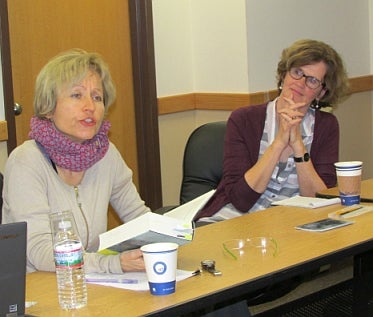
The Berlin-based author and poet Ulrike Draesner studied English, German, and philosophy in Munich and Oxford and has worked also as an academic, translator, and editor. She has received numerous awards for her work, including the Hölderlin Förderpreis, the Preis der Literaturhäuser, and the Solothurn Literature Prize.
AATG Seminar on Curriculum Construction
October 10-12, 2014
For the second year in a row, from October 10-12, 2014, the German department hosted faculty from institutions across the country in a three-day seminar on curriculum construction in college German programs. The 26 participants from 20 different colleges and universities were a highly select group of committed colleagues, eager to consider diverse ways of expanding their instructional offerings, oftentimes under challenging programmatic and institutional conditions. They had applied for this professional development opportunity to the AATG, which had obtained funding from Netzwerk Deutsch of the Sonderprogramm zur Förderung von Deutsch in USA und Kanada sponsored by the Embassy of the Federal Republic of Germany in Washington, DC. Using their own rich experience in curriculum construction based on the department’s nationally and internationally recognized genre-oriented and task-based curriculum, two of our own faculty members, Heidi Byrnes and Marianna Ryshina-Pankova, offered theoretically and empirically grounded presentations on curriculum development; engaged the participants in lively discussions and hands-on work on how to enhance their programs’ contributions to the educational mission of their institutions through innovative curricular thinking; – and sent everyone back energized by the experience and plans to continue the conversation at future professional events.
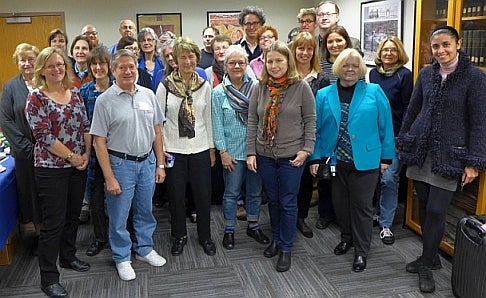
Book Presentation and Discussion with German Author Peter Schneider
September 23, 2014
The Alexandria Eric M. Warburg Chapter of the American Council on Germany, the BMW Center for German and European Studies, and the German Department hosted a book presentation and discussion with German author Peter Schneider on his new book Berlin Now.


Reception for Graduating Students of German and their Families
May 16, 2014
The German Department held a well-attended reception for graduating students of German and their families. Here are some pictures from the event.
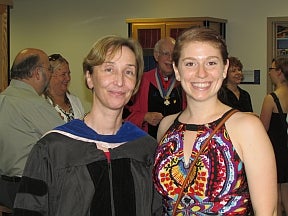
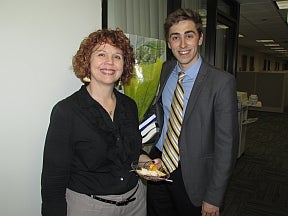
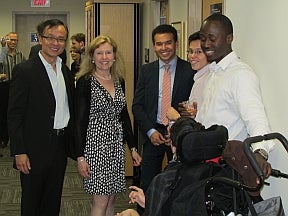
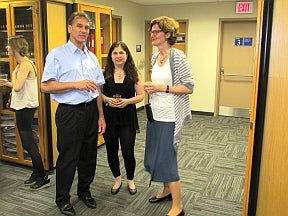
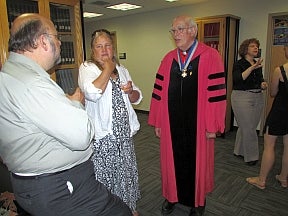
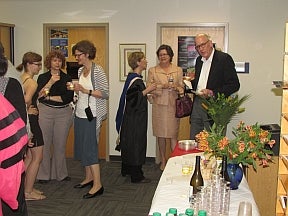
Poetry Reading with Dr. Hans-Michael Speier, Max Kade Poet-in-Residence
March 26, 2014
Dr. Michael Speier is a Berlin-based poet, translator, and literary scholar and the German Department’s Max Kade writer-in-residence during the Spring 2014 semester. In addition to having published a number of anthologies and translated modern English, French, and Italian poetry, he is the founding editor of the Paul-Celan-Jahrbuch (since 1987) and the literary magazine Park (since 1976).
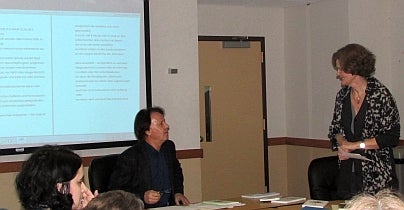
His own poetry has appeared in nine volumes and over 40 anthologies and has been translated into twelve languages. In 2007 he received the Schiller Award. He was awarded the “Literaturpreis der A und A Kulturstiftung” in Spring 2011.
Michael Speier read from his most recent poetry collection: Haupt Stadt Studio. Gedichte. Mit einem Vorwort von Michael Braun, Linolschnitten von Hans Wap und einer Komposition von Wolfgang Seierl, Aphaia Verlag Berlin, 2012.
Performing Blackness in the Transatlantic World: Germany, Race, Intermediality
February 27-March 1, 2014
This conference/festival on the topic of race and performance was held on the premises of the Goethe Institut in downtown Washington, DC. The occasion for this event was the production of We are Proud to Present a Presentation about the Herero of Namibia, formerly South West Africa, from the German Südwestafrika, between the years 1885-1915 by up-and-coming playwright Jackie Sibblies Drury. In this play, a racially mixed company of contemporary American actors wrestles with the question of how to represent the German colonial past. Over the course of the play, memories of American slavery begin to bleed through, inviting an exploration of shared racial imaginaries and theatrical traditions across historical periods, geographic distance, and performance genres. During the conference, performances, film screenings, and video installations, as well as academic presentations continued the exploration of the transatlantic traffic in black images and plots, and fostered exchange of ideas between artists and academics. The event was organized with the Woolly Mammoth Theater, a critically acclaimed theater in downtown Washington, DC, as well as Georgetown’s Global Lab for Performance and Politics.
Kulturkrieg: Germany’s Crusade Against Civilization with Dr. Helmut Schneider
February 24, 2014
The outbreak of the First World War 1914 produced a veritable flood of speeches and writings in Europe, which for the most part sided with the “just cause” of one’s home country. In Germany in particular, notable and widely respected intellectuals, writers and scholars engaged in an often fierce, even militant justification of what they regarded as a battle to defend German Kultur against a potentially depraved Western Zivilisation. Thomas Mann is only the best-known representative of an ideological opposition that reaches far back into the German intellectual tradition. This lecture will present examples of the disturbing alliance of intellectual brilliance and political blindness in Thomas Mann and additional luminaries such as Werner Sombart, Ernst Troeltsch, Max Weber, and Georg Simmel. After the intoxicating initial moment of the summer of 1914, many of them revised their position, without, however, giving up their deeply held cultural conservatism.
Presentation on Telecollaborative Foreign Language Education: Theory, Praxis, and Research with Prof. Julie Belz, Indiana University
November 19, 2013
Telecollaboration is a situated educative practice which foregrounds the potential of foreign language education to serve as a site for the complexification of the self on linguistic, pragmatic, social, cultural, and ethical planes. Opportunities for such development are embedded within class-to-class learning partnerships characterized by an alternation of face-to-face intracultural and Internet-mediated intercultural sessions during which distally located learners engage in critical, ethnographic collaboration on task-based, content-rich projects.
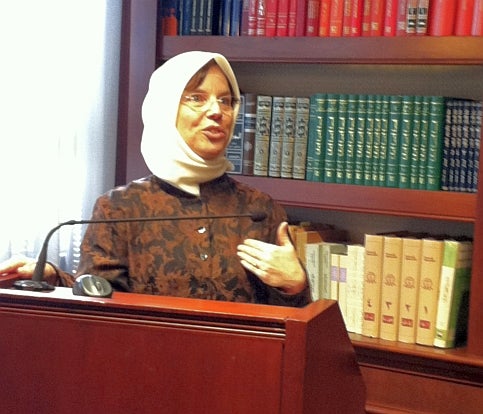
Drawing from six data collection cycles (2000-2005), this talk illustrates the extent towhich learners of German evidence change both pragmatically and interculturally in the language of their telecollaborative interactions. In addition, analytical contributions of telecollaborative pedagogy to SLA research are examined with regard to microgenesis and developmental learner corpora. Finally, points of articulation between telecollaboration and Developing Multiple Literacies, the undergraduate German curriculum at Georgetown, are discussed.
Research Colloquium: From ‘Dark Singing’ to a Science of the Voice: On the Theory and Practice of Literary Declamation Around 1800 with Prof. Mary Helen Dupree
November 12, 2013
In late-eighteenth-century Germany, the term Deklamation was synonymous with a broad range of cultural practices, from theatrical performance to readings of Klopstock’s Messias to the so-called “declamatory concert,” in which music and text were combined in innovative ways. As the declamatory concert gained in popularity, the literary market was flooded with texts devoted to defining the art of literary declamation, providing rules for its practice and establishing a repertoire of texts for performance.
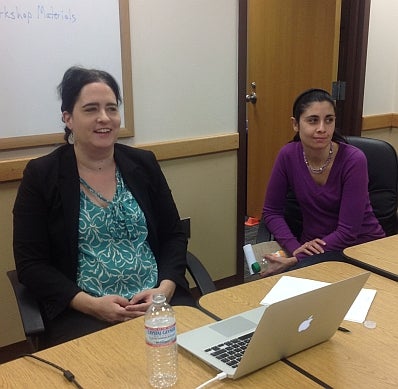
Professor Dupree’s talk explored this early wave of interest in literary declamation, which helped to produce a new theory of spoken language as “declamatory music,” the “tones” of which could be rendered visible through a special system of notation. The culture of literary declamation around 1800 sparked a unique confrontation between poetics, rhetoric, and acoustic science that, while largely forgotten today, is nonetheless crucial to the project of writing an acoustic history of German literature and culture around 1800.
Seminar on Curriculum Construction in College German Programs
October 10-13, 2013
The department was proud to host faculty from institutions across the country in a three-day seminar (Oct. 11-13) on curriculum construction in college German programs. The 24 participants from 13 different universities had been selected from a total of 108 applicants from 79 institutions. They had applied for this professional development opportunity to the AATG, which had obtained funding from Netzwerk Deutsch of the Sonderprogramm zur Förderung von Deutsch in USA und Kanada sponsored by the Embassy of the Federal Republic of Germany in Washington, DC.
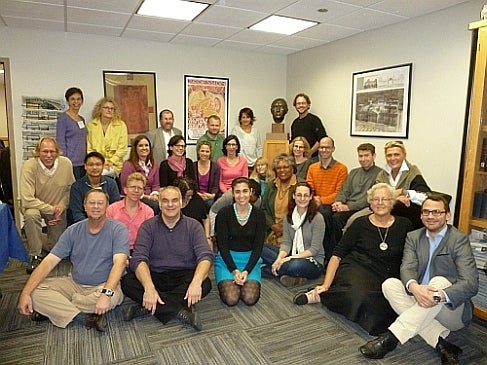
Using their own rich experience based on the department’s nationally and internationally recognized genre-oriented and task-based curriculum, two of our own faculty members, Heidi Byrnes and Marianna Ryshina-Pankova, offered theoretically and empirically grounded presentations on curriculum development; engaged the participants in lively discussions and hands-on work on how to enhance their programs’ contributions to the educational mission of their institutions through innovative curricular thinking; and sent everyone back energized by the experience and with plans to continue the conversation at future professional events.
Research Colloquium on the Humanities Assessment Project
September 24, 2013
The September research colloquium focused on the Humanities Assessment project that has been conducted for the past two years and aims to determine humanities learning goals and outcomes across various curricular levels, as well as develop curricular-specific approaches to assessing whether these are achieved by the students in our program.
Heidi Byrnes and Marianna Ryshina-Pankova reported on some of the quantitative and qualitative findings of the project that included discussion of our understanding of reflective stance and its linguistic realizations as a major outcome of humanistic inquiry. In a group work session, colloquium participants had an opportunity to connect the findings on the nature of reflective stance to the analysis of some sample learner texts.
Symposium on German-Polish Border Regions in Literature and Film: Transnational Approaches to National Histories?
April 5-6, 2013
The two-day event opened with a screening of the documentary Ostpreussenland (Andreas Voigt) at the Goethe Institut, Washington, DC, introduced by film expert Randall Halle.
Speakers included Werner Nell (Martin Luther Universität Halle-Wittenberg), Irene Sywenky (U. of Alberta, Edmonton), Friederike Eigler (Georgetown), Randall Halle (U. of Pittsburgh), and two of our own PhD students, Claudia Winkler and Meghan O’Dea.
The Symposium concluded with a reading by the author Sabrina Janesch from Katzenberge (2010), a novel that revisits German-Polish history from the perspective of a contemporary traveler.
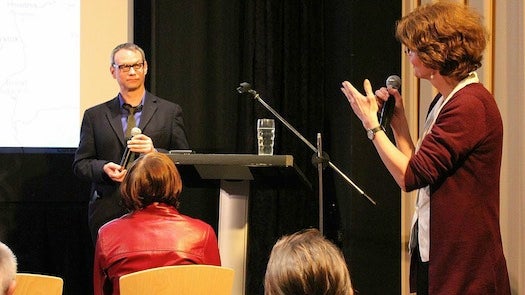
“Europe?” — A Conversation with Author and Essayist Peter Schneider
April 17, 2013
Peter Schneider is one of the leading intellectuals publishing in Europe and the United States. His features have appeared in such diverse venues as Die Zeit, Frankfurter Rundschau, Spiegel, Süddeutsche Zeitung, Guardian, New York Times, Le Monde, La Stampa and others. His novel Lenz achieved cult-status when it was published in 1973. Der Mauerspringer (The Wall Jumper, 1982) is still considered one of the very best books about Berlin and was recently re-published as a Penguin Classic. Schneider is also well-known for the movies he scripted, including Das Versprechen (1995). He is involved with the German PEN and was one of the writers who went into the former Yugoslavia to monitor the wars.
His latest novel, Die Lieben meiner Mutter was published in May 2013. A collection of essays on Berlin will be published in English later this year by Random House.
Reading (in German) from Die Lieben meiner Mutter with Author and Essayist Peter Schneider
April 12, 2013
Please see information on author Peter Schneider above.
“The Image of the 1968 Radical” with Prof. Susanne Rinner
March 15, 2013
A plethora of publications, representations, and anniversary commemorations have dealt with the 1968 student movement in Germany and ongoing culture wars on both sides of the Atlantic speak to the significance of the global social movements that shaped the sixties and seventies. In her current research, Prof. Rinner (University of North Carolina at Greensboro) is particularly interested in bringing together visual and textual images in what Elisabeth Bronfen has called “crossmapping.” Prof. Rinner asks how images of political radicals are being moved, juxtaposed, and superimposed and which effect these moving images produce. As an approach to reading images as metaphors that transcend their immediate aesthetic context and connotation, she argues that Bronfen’s theory provides a critical framework in order to understand the image of the radical.
